#but what was said does make a lot of narrative sense with these characters and how they've done things in the past
Explore tagged Tumblr posts
Text
I'm finally going through and starting to read some of the articles that have come out after episode 8 (because this hiatus is hitting me hard, and I can't move on), and read this screen rant interview. I had a few thoughts while reading this that I think will be very interesting to see play out on screen.
Firstly, Eddie's reintegration of joy back into his life is going to play a role in moving back to Texas, a place that he did not enjoy living in. Eddie letting himself find joy after Christopher left was necessary, as he was using the alienation as a form of self-harm, as he felt he did not deserve forgiveness. It was only after finding that joy again, that he was able to push himself into actively trying to bridge this gap.
Of course, bridging this gap means moving to Texas. Which I personally have complicated feelings about, as I don't think permanently moving is a good idea, but a temporary move to fix the issues is necessary. I'm going to come back to this thought in a second.
Why I bring up the whole joy thing, is because Christopher isn't a little kid anymore. He's really smart and is fully capable of picking up on his dad's emotions. We saw this when Eddie left the 118 in season 5, and Chris was around 11 at that time. He can tell when his dad is suffering and is affected by that. Even with his anger at his father now, he will still see how his dad hates living in Texas, and that will affect him, even if he doesn't acknowledge it.
And I think as they start to bridge that gap, and grow closer, Chris isn't going to want to see his dad suffering. In the birthday party scene, with that anger so fresh, there was that satisfaction that he was hurting his dad back. Something many teenagers want when they lash out. However, when there's no want to cause hurt, Chris is going to feel bad that his dad is suffering because of him. That is something that is going to, hopefully, play out on screen, as it would be a very nice conversation to see between father and son.
Not to mention, that it would further Eddie's finding joy arc, as Chris, or the people around him in the aftermath of the main conflict, continue to encourage Eddie to act for himself, instead of solely for his son.
Bringing this back to the whole moving plot, I have some thoughts about how this is actually going to play out. One, I think is it is necessary for Eddie to at least temporarily move to Texas. He needs to confront his parents, and Chris, in person, that is the only way this will get resolved. Especially with how the FaceTime calls keep getting interrupted by one of his parents occupying Chris in order to cut their time short. Eddie needs to go to Texas.
However, I don't want his ties to LA to be completely cut off. Not only would that bring unnecessary complications to the story, but also from a production standpoint. They already have Eddie's house as an established set, I can't see them totally abandoning it without a direct purpose.
Furthermore, this isn't the first time that a character would take an extended leave from work to go and deal with family issues. Chim did it in season 5, and I can see them doing the same sort of thing with Eddie. My main hope is that he just rents a property, whether that be a house or an apartment, while he fixes things with Chris. That way it leaves a door open for Eddie and Chris to move back to LA.
Another thing that was mentioned in the article that I liked, was that the conflict with Eddie's parents will be addressed. Something that, specifically with their opinions about Chris, has not been addressed since very early on in the series. They had that minor confrontation in season 5, but that was more between Eddie and his father, and their issues.
I am so happy that this will be addressed, especially considering it was directly quoted from Tim that they have always wanted to raise Chris. Dealing with this is important to the story, and will be very interesting to see on screen.
Again, considering Chris is much older now, and will fully understand the tone they use when speaking to Eddie, as well as the intentions behind their words. He hasn't really heard this from his grandparents, and I can see it changing some of his perspectives.
Especially if they bring up his mother. Because as complicated as his feelings are about her, it's still his mom. She still tried the best that she possibly could, and I would love to see that letter he got in season 7 to come back again, because it really shows her motivations of leaving in a way that Chris has never had expressed to him before.
Anyway, I am both nervous and excited to see this play out, and will surely have many emotions about it no matter what.
#morgan's thoughts#as always i take what the interviews say with a grain of salt#but what was said does make a lot of narrative sense with these characters and how they've done things in the past#so i'm hopeful#also#this hiatus is really going to kill me#get ready for me to talk about this at least a dozen more times#911 on abc#911 abc#911 theories#911 thoughts#911 specualtion#eddie diaz#edmundo diaz#christopher diaz#911 season 8#911 s8#911 s8 speculation
5 notes
·
View notes
Text
can i be hypocritical for a second
#shut up hanna#she says she doesn't want to hear people talking about him and then makes a post to talk about him. sorry here we go#i don't think a lot of the people obsessed with tommy are fully examining WHY they are so obsessed with him#because i'm not gonna say they're necessarily racist but i do think that they hold these implicit biases in favor of white people#(biases which poc can absolutely hold as well)#(why do you think so many poc exclusively date white ppl and then chalk it up to personal preferences)#which is why this guy that has barely had any screentime now has entire blogs dedicated to him and is getting defended by people in the#fandom in a way gay poc characters like michael and hen never were.#and you could say okay hanna well what about josh! he's a white gay man and people don't obsess over him!#and that's true and likely because a) he is not kissing buck and b) you can't attach a repression storyline to him#which is another thing people in fandom seem to gravitate towards. men with internalized homophobia.#another thing that seems to stem from these implicit biases in favor of masculinity in gay men#which now come to think of it is only enhanced by his whiteness. bc god if tommy wasn't white??? y'all would be saying the nastiest shit#which i know because it is the shit you say about eddie when you try to spin the narrative that he's homophobic. bc he's latino.#but no because tommy is a white man with previous internalized homophobia it's a beautiful tragic backstory#and you can watch the beautiful story of a masculine man becoming vulnerable and it's the most amazing thing you've ever seen in your life#and the amount of screentime this man has gotten does not warrant the amount of attention and obsession he's garnered#so i truly do think the only reason anyone would be such a big fan of his is because of their own implicit biases regarding#whiteness and masculinity#which if that was something these people would actually acknowledge and own up to? then i don't think i'd have a problem with them#and i'd be hypocritical (lol) if i said i don't also hold these biases and they seep into my fandom interests#but i'm willing to sit down and think hmm why am i acting this way about this character and should i be trying to reshape my thinking.#instead of doubling down and calling everyone that talks shit about my obsession homophobic no matter the context of their shit talking#i feel like i have more to say but i can't remember now and also i hope this makes sense bc i'm so lightheaded rn i need to eat dinner
0 notes
Text
Striking reading Embassytown immediately after Don Quixote because whilst you wouldn't usually compare sci-fi (published 2011) to a parody of the chivalric romance genre (final part published 1615) they are nevertheless strikingly similar
#like embassytown is about language: who controls communication; truth vs lies vs metaphors vs similes; what if there were no such thing as a#Concept You Had No Words For (Yet) what if you could only experience what you said#don quixote is about a guy who's a bit cringe and gets beaten up a lot#but they are also both about stories and communication#don quixote goes on his adventures because he reads too much and thinks them real - the narrator frequently refers to The True And Real#History of Don Quixote even though what we're reading is no more real than what he read and believed to be true#embassytown's plot hinges on lies but also I think the question How can we communicate across the vast differences between us#and even as the characters begin to lie so does the narrator (or at least finds herself struggling to tell the truth)#Cervantes - through Cide Hamete Benengeli - complains at the start of part 2 at how someone took his story away from him; wrote a second pa#Embassytown's narrator 'admit[s] defeat. [...] Perhaps because I didn't pay proper attention perhaps because it wasn't a narrative but for#whatever reasons it doesn't want to be what I want to make it'#Benegali tells us 'no [story]* can be bad so long as it is true' Avice says 'This is a true story I'm telling but I am telling it and that#entails certain things'#Do You Kinda See My Point. it's about how we tell stories to each other and how we communicate the non-real#*many translators translate 'historia' as 'history'. discuss amongst yourselves what impact that makes vs its other meaning of 'story'#I don't actually know how much sense I'm making; I'm tired and I'm just rambling in the tags#but like it's cool
1 note
·
View note
Text
i think that kui portrayed kabru's mental health issues in a very interesting way, but it's what makes it subtle to some readers. the fact that he seems so functional to the readers, especially in the first few appearances, not to mention that a lot of his problems and symptoms are not obvious and can only be seen in additional materials, seems like an intended choice from the character writing perspective.
the way kui constructs his character centers around the idea of duality. he switches between two "faces" in the story constantly, he uses two speaking styles (and two pronouns indicating them), he's a tallman who lived with elves for a long time and carries both cultures, he's caught in the conflict between long-lived and short-lived races, he's constantly stuck between two choices in his inner conflicts (what to think of laios? should he prioritize preventing another tragedy or taking away power from long-lived races?), he's bisexual. kui also made him a gemini, yknow, a zodiac sign associated with twins and duality.
there's a certain theme in this and it does affect the way we interpret his personality and choices and it goes beyond text, it's metatextual too. it's a sway between what's hidden and what's shown to the readers about him.
the thing is, i think his mental health issues are meant to be downplayed and hidden, because it's true to his character. what do we notice about him in the main story and what's hidden? well, one of the first things we see is that he's not great at fighting monsters, he suffers from ptsd that makes him basically freeze up just from thinking about them. images of dead people turning into monsters, tearing each other apart and eating each other haunt him, making him feel ill from monster food. he downplays this a lot, hides it from other characters, straight-up lies about it, but at least readers got to see it.
with a keen eye you might notice that he doesn't eat enough food, almost never eats anything on-screen. he mentions that he's never cooked food in his life: wait, kabru, don't you live alone? in that sense "don't you wanna eat?" moment reveals two details of kabru's character at once: we got to see his aversion from monster food related to ptsd, but also his inability to notice his own hunger in general. he's strong and he almost always wears armor, but we know that he often dies in the dungeon. the armor hides that he's pretty scrawny for someone who fights physically, again, something that we can only notice after he takes off his armor (symbolism!).
funnily enough, here we have our first glance at this through additional materials: in the info page about the importance of calories and fat, kui mentions that kabru has lost a lot of weight since he started exploring the dungeon, because he died a lot. what it means is that he doesn't eat enough to cover the loss of weight. subtle, but clever detail.
speaking of him not knowing how to cook, this is another clever detail that hides bigger truth: kabru doesn't know how to do chores, he doesn't take proper care of himself. extra materials reveal to us that kabru lives in the basement, lacking light and clean air and he doesn't know how to clean his room or how to iron clothes and simply... never cared to learn? this is mostly omitted from the main story, even if it does have a place for it: for example, his journey with mithrun becomes infinitely more fascinating, when you know how little kabru cares about himself. but since those chapters are told through kabru's pov, he basically "hides" this from the reader, takes control of the narrative in the same way he tells a polished version of his tragic backstory.
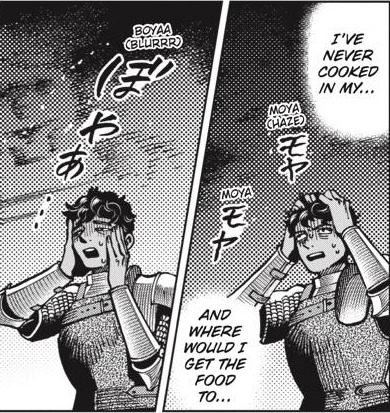

he talks about mithrun's story like there's no connection, like he's not literally looking at the dark mirror of himself. and, ironically, he chooses to not be vulnerable in front of the readers just like young mithrun wouldn't. extra materials give us a glimpse again: when in the main story mithrun said "i can't fall asleep without spell or potion", in the extra comic (literally behind the scenes) kabru says "i use alcohol to help me fall asleep". there's a connection and kabru sees it, but he's not telling it to us. (and yes. there's evidence that kabru is an early-stage alcoholic. we can see bottles under his bed and what he says basically imply that he depends on alcohol: he's not using it for recreational purposes, he's using it as a substance to make himself sleepy and, probably, less anxious. when that dependence turns uncontrolled, it often leads to full-blown alcoholism).
bigger connection to mithrun is of course kabru's refusal to accept his own humanity, to see that he's alive, that he has his own needs and desires. he's suicidal in the same way: he can only see his goal, he doesn't care about his life, he only sees the value of his life in relation to that goal and he never think what's gonna happen to him after he reaches this goal (because he unconsciously believes that "the after" wouldn't happen to him). and he doesn't reflect on it, again, until he's met with a question "what do you want to do?". the way he doesn't see himself as alive is omitted again in the big portion of the story and only really comes up in the end, when he asks "what was the point of my survival?", in a basically joking moment.
but we can see it through the symbolism, through his connection to death in the story, through his eagerness to sacrifice his life for the idealistic goal in his mind. and of course, we can see it clearly through his mirror: there's a strong parallel between kabru almost committing double suicide while chasing his goals and mithrun literally getting himself killed while chasing his own.
what i'm trying to say, it's interesting that kabru uses his control of the narrative to hide his own vulnerability from the readers. maybe mithrun sees himself as leftovers and it's something cathartic for him to admit in the end, but kabru really doesn't want you to see that he feels the same way. that he's also "leftovers". but you see, they are standing together in that panel. as kabru continues to try shielding himself from your view, kui puts the mirror next to him, revealing what's hidden.
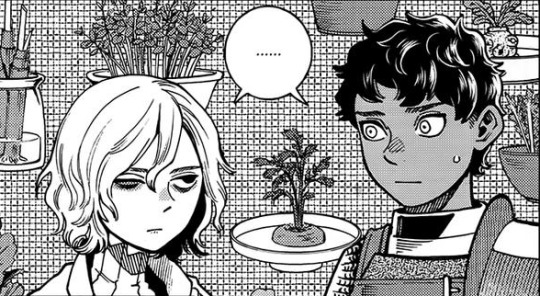
606 notes
·
View notes
Text
It's not that I hate fanon or that I think fanon is inherently less intelligent or morally wrong, but a LOT of fanon is based in racism, misogyny, and classism that I feel like a lot of you accept without question.
WHY is Duke (Daredevil, son of a god, has never once allowed himself to be defined by anyone's actions but his own) relegated to a background role, only characterized by reacting to the whims of other bats?
Why is Babs - Birds of Prey leader and backbone of the hero society, tells Bruce to fuck off and die 4 times a day and is constantly ruining her relationships by being biased and unhinged - Gotham bound, the mature responsible mom of the group who never argues with Bruce and never gets in trouble?
Why is Dick, both a tactical genius and master manipulator, a himbo only appreciated for his sex appeal? Especially when he is both Romani (group of people demonized and condemned as hypersexual by their nature alone) and an SA victim.
WHY is Damian "feral" and "uncivilized" despite being raised as a literal prince? Half of you treat him like a sociopath with no hope of redemption for an unfunny three second joke and the other half of you go full throttle into Bruce's white savior bullshit so that Damian can be "redeemed". Y'know when you're not villainizing Talia and acting like Dick is his other parent, actually.
WHY is Stephanie - extremely intelligent detective who can't stand Bruce and has a living mother she loves - lumped in as another member of the Batfam, a blonde ditz who only cares about prank wars and emotionally supporting Tim?
WHY is Cass - intelligent, a grown adult, suicidal perfectionist - emotionally intelligent, primarily existing to support the characters around her, immediately accepting of everyone she meets regardless of her own morals?
Why is Bruce the golden standard? Enough so that though everyone in the fandom could agree that he's an emotionally unstable wreck, being considered "the most like him" is seen as a compliment and not the HIGHEST insult? Everyone would agree if I said that Bruce purposely self sabotages his relationship half the time and the other half he simply does things without caring about the emotional impact it will have on people because he has to be the smartest in the room, but if I said that makes him a shit partner and emotionally abusive parent the fandom would bend over backwards to argue with me.
Why is Tim "the best Robin" when Dick Grayson invented the mantle, it is impossible for someone to embody the spirit of Robin better than him because he made it and he created what being Robin means. Maybe Tim is the best in Bruce's eyes, but what Robin means and who has the right to give it over was a significant thing they argued about. Tim the high school drop out, and yet also somehow the smartest? Tim "the most like Bruce" except no he's not, that's Cass. Poor neglected, abused, victimized little Timmy (the rich boy at the elite boarding school with loving albeit busy parents and almost every instance of him being victimized by another character has either been racist bullshit - The Al Ghuls and Rose Wilson- or a complete 180 for the character that made no sense when examined through the lens of prior characterization - Jason for instance.)
Almost every fanon trope that gets passed around like gospel seems to deliberately push POC characters and women into the background and strip them of interesting complex traits and stories, usually for the purpose of fitting them all into bite sized incorrect quote character types and uncomplicated narrative roles that are not only completely divergent from canon, but primarily exist to prop up the two rich white boys.
Also the insistence that Bruce, a 20 year old at the time, should actually be excused for how much he mentally and emotionally fucked Dick up because really they're more like siblings! While deciding that Dick at the same age was actually the perfect candidate to be Damian's new parent/guardian...have you lost the fucking plot you don't even make sense to yourselves.
Okay I lied at the beginning, I do hate fanon. You guys are so uncritical about the media you consume it is BEYOND just letting people enjoy things and have fun. I guess it's one thing if you KNOW this stuff isn't canon and UNDERSTAND why these tropes are problematic and you engage with it as such, it's fine read and write what you want, but just spreading the same nonsense around and parading it around as "better than canon" (version of the character so bland and boring you've somehow made the old white men at DC look like geniuses in the art of representation) is just infuriating.
#I didn't talk about Jason because every other post I make is about how bad fanon has fucked him up#and I would have mentioned Helena but honestly her being pushed out of the family is more a matter of people not reading comics#I wouldn't consider Jason her “replacement” accept in the moral philosophy department#wherein Helena feels an inherent guilt that Jason simply doesn't#and while Helena is firmly an anti hero Jason is willing to kill heroes if it means accomplishing his goals#I do think there's something to be said about his fanon relationship to Bruce and Cass#that directly replaces Helena's actual canon relationships though#If any of you bring up the Catholic Jason headcanon I'll kill you#I made posts about that already she did not trademark Catholicism#dc#canon vs fanon#bruce wayne#dick grayson#damian wayne#stephanie brown#cassandra cain#Barbara Gordon#duke thomas#tim drake#It IS really weird how you guys keep giving Bette Kanes actual canon identity to random people#like damn you couldn't even do a cursory Google search before you gave Wally or Tim or w/e her mantle
303 notes
·
View notes
Text
Unfortunately I came across a very strange and misinformed video about Black Butler.

It’s not good. Don’t watch it. Unless you wanna ruin your day, in which case have fun.
Despite it all, I watched it. What left me wondering, however, was how off the mark the person who made the video was on, well, everything.
From their insistence that the Book of Circus Arc theme or point is non existent, to reading Ciel’s character so badly they genuinely thought the Green Witch Arc did nothing for his character development.
While baffled, it also made me think on how someone could read Black Butler so badly.
Sure, you can say that there’s no real way to read or interpret something “in the wrong way” but interpreting The Hunger Games as a pure battle-royale action story would make you believe it’s bad.
“Why are we focusing so much on how the capitol preps them?” Or “Why isn’t Katniss winning everything?” Or “I wanna know more about the rebellion” All questions that miss the actual point of the story - which is criticizing (not solving or ignoring) the way that media distracts us from violence via spectacle.
The same thing applies here. While there is no “right” way to consume media, there’s things that the author makes clear they wanna focus when creating a story. Things that, if you understand, make the story you’re reading actually make sense.
And in Black Butler there’s three things that you have to understand to properly get what Yana is saying.
Sebastian is the protagonist
Ciel and Sebastian’s relationship IS the story.
And that relationship is, fundamentally, a positive one.
A quicker version of it would be:
Black Butler is a love story from the POV of Sebastian, and you have to ship it to get it
- but that’s not entirely true.
You can still look at it as a complex but ultimately positive rship and get in broad strokes of what it’s conveying. It doesn’t have to be romantic. Although, it helps much more than a platonic framing.
(That said, interpreting their rship as father and son, still isn’t the best way to go about it. Mostly because by its very nature of “soul consuming” their relationship is extremely sexually charged. And hey, if you’re into that I don’t judge. However, if you’re desperately trying to interpret their rship as NOT romantic to the point you fall back on heteronormative patriarchal ideals of nuclear familiar as framing device, I don’t think this interpretation bodes with you)
Now, having all that ground work:
Why do I say these are the key components to understand BB?
Okay so, first,
1. Sebastian is the Main Character. The protagonist.
There’s a lot of people who wanna argue against it, claiming he’s either the villain or the antagonist. Both wrong.
He does not function as an antagonist. Even if, and an emphasis on if, you consider Ciel to the protagonist, Sebastian isn’t a narrative antagonist.
If you wanna go back to Creative Writing 101, be my guest. An antagonist is directly defined by the protagonist. It’s the opposing force. If the protagonist wants A, the antagonist wants to stop them from getting A.
Sebastian’s catchphrase is “Yes, my Lord”. He never opposes Ciel, in fact quite the contrary. By the mere fact they’ve created contract, it means that they’ve both agreed in the inevitable outcome.
People want to frame Sebastian as the villain, because Ciel having his soul taken by a demon, would be a BAD END in the context of their moral compass. They see Ciel as a frail victim of abuse, who’s being tricked by Sebastian, who wants Ciel’s soul.
Which is an. Interpretation. A bad one. But still one.
The narrative (and whether the narrative fits your personal moral compass and lack of critical thinking is irrelevant) treats Ciel as an agent in his own destiny. The abuse he suffered was the moment in which he had no control. It’s only after he meets Sebastian that he can rid of both his guilt and his despair, and do what he wants.
In this case though, it’s revenge.
The famous “Asthma” scene shows this. If Ciel is taken back to his past, he becomes helpless. Swarmed with pain and memories that make it so that he can’t even react. Sebastian is his saving grace. If Ciel didn’t have him, and the power he wields to rebuilt what’s broken, he would crumble once more.
If Ciel has a panic attack, because of all the pain he has, Sebastian picks him up and says “you are not a helpless child anymore, you are not a victim anymore, you have the power to do anything. So, what do you wanna do?”
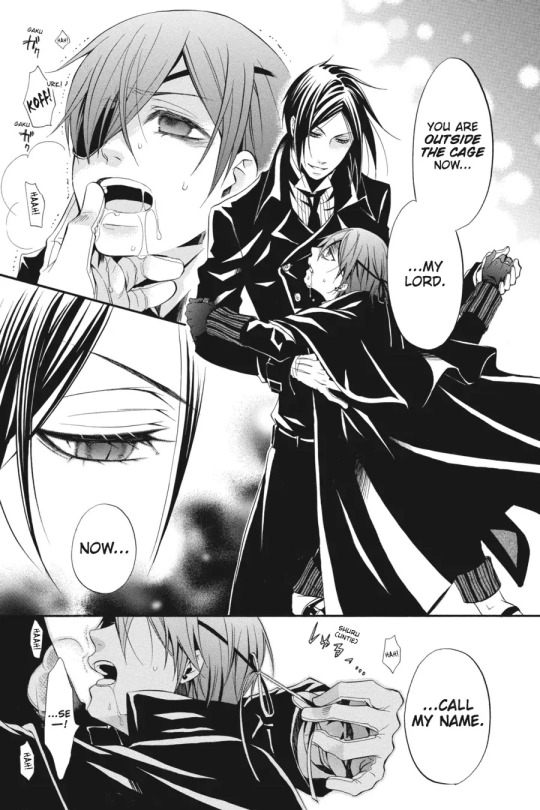
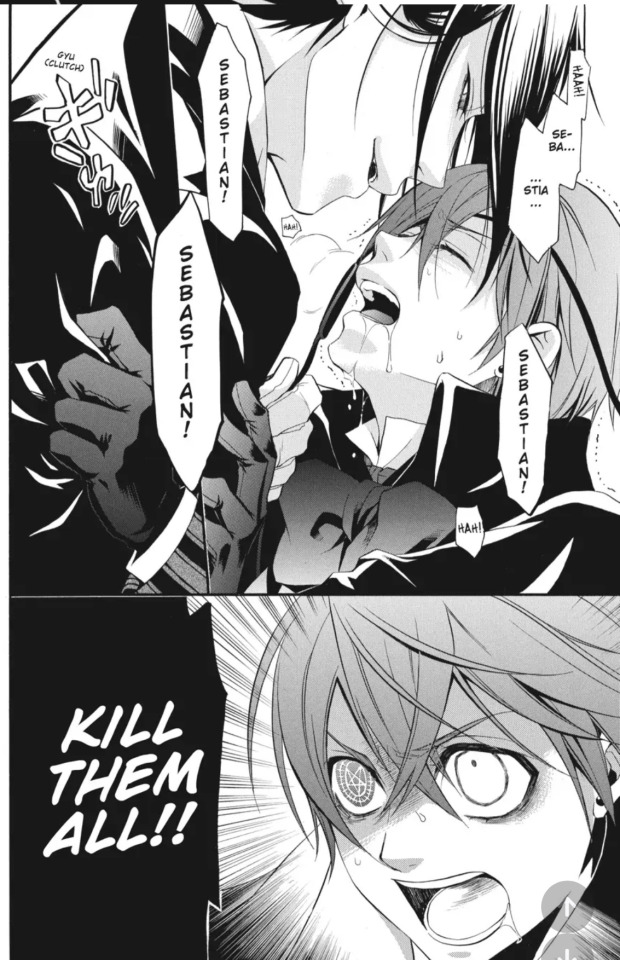
Ciel’s answer is to kill them.
A proper analogy would be to say that, if Sebastian offers a gun, Ciel pulls the trigger. They are both at fault. Sebastian, strictly speaking, is not here to directly cause Ciel’s downfall, but as a tool Ciel uses to plunge into the abyss.
If, again if, you were to frame Ciel as a protagonist, Sebastian falls closer to the “Voice of reason” character. Not a literal voice of reason, but a literary one. If you have a protagonist and an antagonist exchanging ideals, the Voice of Reason serves to engage with the protagonist on their own ideals.
That said, Ciel isn’t the protagonist. The story quickly falls apart if you interpret it as such.
Things such as Ciel’s character arc being…shall I say odd?
It’s not that his character arc isn’t there, but it’s never lineal. His goals stay the same, the only thing that happens is that we start to peel back the “why”s of his goals. Throughout the series it’s never about Ciel understanding himself better, he knows who he is, he knows what he wants, he knows why he wants it. He doesn’t ever need to uncover these, but simply remember them. Because it’s always about the audience understanding Ciel.
He knows he wants revenge.
In the Circus Arc: He knows that he needs Sebastian because without him, the pain of the abuse he suffered would be too much to bear. But WE are introduced to it.
In the Book of Atlantis: He knows that with this new lease he does not want happiness and peace, he wants revenge. The one being told this is the audience.
In Green Witch Arc: He knows that their revenge isn’t for his family, the real Ciel or guilt. It’s because he wants it. He’s angry, he’s upset, and this is entirely for him. The one being told this is the audience.
Except. Not really. The one either discovering or remembering these key moments - is always Sebastian.
Sebastian is the one who reassures him that he now holds the power of a demon to override the pain. Sebastian is the one who remembers that to override that pain, Ciel wants revenge. And Sebastian is the one who discovers that that revenge isn’t built out of grief or guilt, but for himself.
We are witnessing it all, through the eyes of Sebastian.
This is why we have an extremely vague idea of who Ciel is, Sebastian does not have the whole picture.
If you haven’t been reading this manga with your eyes closed, you’ll realize we have a better grasp at Sebastian’s character than that of Ciel. We get a lot of insight on how he thinks and what he values through light hearted dialogue he has with the servants. You even see the character development in these little interactions.
Think about how when he first arrived to the mansion he magically created food with no regards to taste, but when he meets Bard he states that food is created to see whoever will eat it, smile.
That is character development, more than you will be able to see from Ciel.
Because Ciel’s character, while not static, doesn’t go from point A to point B. Mostly, cause it doesn’t need to. He went through that when he lost the real Ciel and got Sebastian. Everything we are watching is the falling out.
Now, given the fact that I’ve told you that it makes more sense for Sebastian to be the protagonist/main character, and that he 100% isn’t either a villain or antagonist in ANY of the interpretations you can get:
Do you believe me?
If you don’t, you’ll probably believe Yana herself.
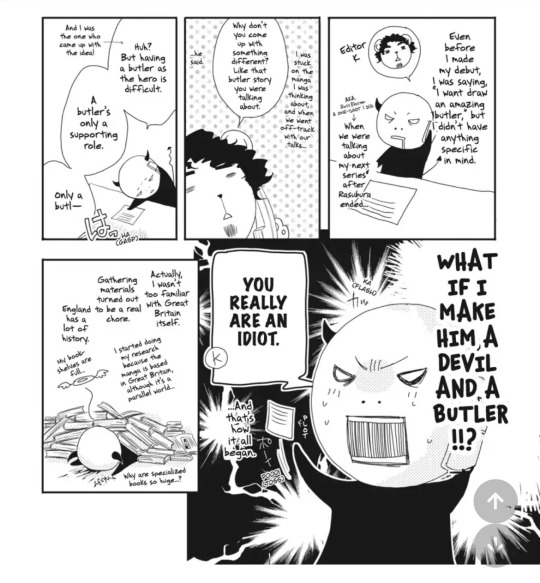
This is from the first Volume, where Yana herself describes the process of making Black Butler. The primary idea behind the creation of BB was a butler as a “hero”.
If you go back to the introductory chapter, you notice that Ciel is barely mentioned. He’s simply the one to give Sebastian impossible tasks and standards that Sebastian must find how to overcome.
Ciel is properly introduced until the NEXT chapter. The second chapter has this formula too, introducing Lizzie as a problem to overcome. Although, to Sebastian the best way to “get rid of the problem” is simply to indulge her.
The issue here being that the problem isn’t as simple as a business meeting but something directly tied to Ciel and Ciel’s past. Each time that Sebastian has to solve a problem, it chips away at Ciel. While with Lizzie he shows a persona, once he’s alone with Sebastian he acknowledges the toll it took on him. It serves to build Ciel as Sebastian’s master, and how some problems aren’t as simple as discarding a tablecloth.
The third and the fourth, are a unified narrative, with a similar premise to the first chapter. Ciel gets kidnapped and Sebastian must find a way to retrieve him without raising suspicions.
If the first chapter is to set up what Sebastian must do as a butler, the third and the fourth serve to set up what he must do as a demon.
The entirety of the volume, and up to Book of Circus Arc, is about how Sebastian tries to follow the increasingly absurd orders that Ciel has - it is not about Ciel trying to solve them.
That’s how they work, we follow Sebastian for the most part, because he’s the one having to come up with the solutions.
If anything, in early Kuro, where the emphasis was more on a slice of life conflict, Ciel is the antagonist. He’s the one creating problems for Sebastian to solve.
What’s more, in the second volume, the very first chapter is one from Sebastian’s POV. So far, we hadn’t gotten an entire chapter from Ciel’s POV. In fact, I would find it hard to point to a single chapter where Ciel is the POV throughout. The reveal of real Ciel and the flashback is the closest contender.
But once we move past early Kuro, and into Book of Circus, this set up changes.
It’s fairly easy to assume that Ciel is the main character, because from this point on the conflict of the plot sorta surrounded him. We spend a lot of time with him and with his story. The enemies start being people directly tied to Ciel and Ciel’s trauma. Rarely, if at all, we get to see Sebastian before he met Ciel.The framing device for the story, is Ciel.
This is where point 2 gets intertwined.
2.- Sebastian and Ciel’s relationship IS the story.
The story begins at the point where Sebastian and Ciel met. Who Ciel was before he met Sebastian, informs why he’s the way he is when he does. You have to know all he went through to understand why he’s a brat, why he lashes out. However Sebastian’s past doesn’t matter…because Sebastian himself doesn’t care much for who he was, before he was “Sebastian”. That’s also part of the narrative.
Unlike Ciel, he doesn’t seem opposed to revealing information from before the contract. He talks about how pets from where he is from are gross, he talks about how he knows how to dance because of other places he’s been to, and alludes to the life he's lived before.
Just that, to him, they're footnotes.
He makes allusions to a very bland, uninteresting life, up to the point he meets Ciel.
That’s why we don’t know more about his past.
As for why we focus on Ciel’s story…okay maybe we need Creative Writing lessons 102
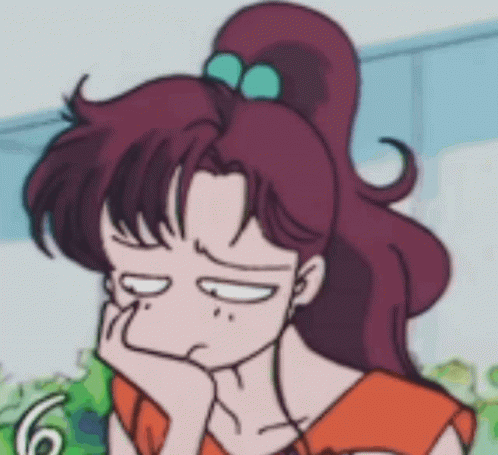
I studied Dramaturgy for about 3 to 4 years. And something you notice is how play-writing is the quintessential story telling. It’s making it work with the bare bones of a story.
Some other mediums have more finesse, more depth, or more spectacle - all amazing things that work for whatever they’re created for. But understanding a play, how and why it works, helps understand the fundamentals of any derivative story telling medium.
Particularly, conflict.
Conflict is dialogue and dialogue can take many forms. A story, in its essence, is a dialogue between two opposing ideas.
Take Batman, for example, who embodies the ideas of justice and order. On his own, he’s not a well rounded character.
If you ONLY present him, in a vaccum with nothing else, you don’t have a character. You have a list of characteristics that you’re supposed to know.
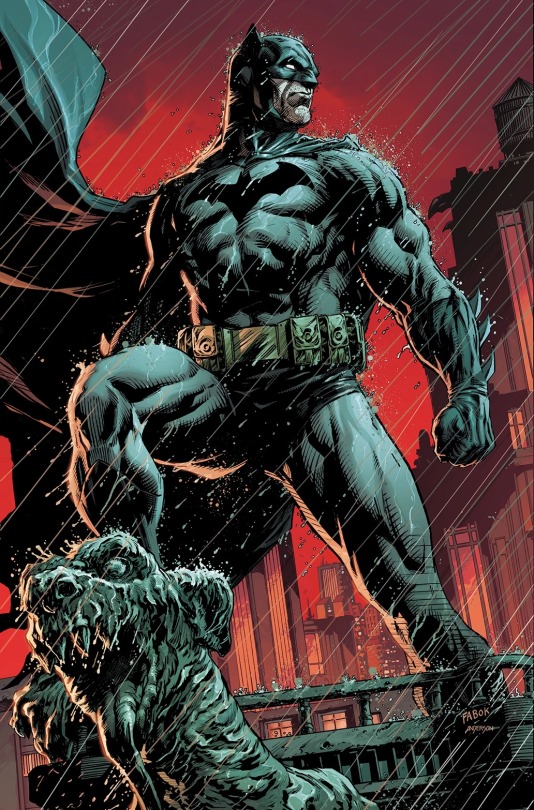
You only know who he is when you have dialogue with another character.
I say Dialogue, but it doesn’t necessarily mean spoken language at one another. Dialogue can mean fist fighting, playing tabletop games, talking to other people about the other, or even just a competition. The idea is to simply to compare and contrast both ideas.
If you want an example on how tabletop games serve as dialogue, watch the video “Well, Someone Had to Explain the Liar’s Dice Scene” by Lord Ravecraft
Another example, were we to retake Batman, you have him fight Joker. Who’s the embodiment of chaos and randomness.
In the following picture, you get far more information than the one previously shown. While the Joke fights with daggers and fake guns, Batman only uses his fists. He doesn’t use the tricks that Joker does. His serious demeanor, contrasted with Joker’s glee at the dangerous situation. The fact that Batman has a deathly grip on Joker’s shirt, while the Joker doesn’t, which shows a desperation to catch him.
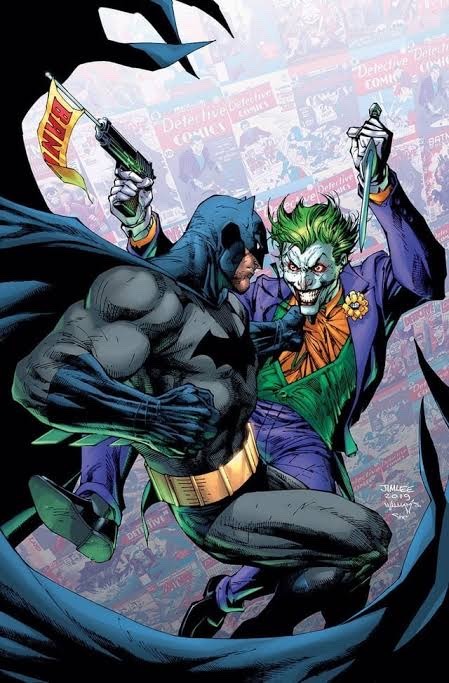
You are being shown, through a dialogue, who Batman is.
It’s so much easier and much more effective to explore a character through another character.
This is the reason why Shonen has a tendency to make incredibly good gay ships. If you want to explore Naruto’s personality, and his feelings of inferiority, you HAVE to have him interact with Sasuke.
If you wanna understand Hinata’s passion for volleyball, you have him enjoy himself the most with the only other crazy motherfucker who’s as obsessed with volleyball - Kageyama.
And I think that originally, Yana had this problem.
Sebastian was the protagonist, but she had little room to develop him as a character in the confines of the manor, dealing with random enemies.
She likely tried to create Grell as someone of the same stature as Sebastian. Someone who could be this other person to engage dialogue with and show or allude to his past a bit more.
The problem being that Sebastian didn’t care for his past. Or really, engaging with anyone. He sees everyone as below him, but when confronted with Grell who isn’t below him, he doesn’t wanna talk to her.
So you’re stuck in conundrum.
How do you have dialogue with a character, that as a character trait, doesn’t really wanna have dialogue?
Well, Grell also solves the problem. Because only the moment she gets him to start any semblance of a dialogue - is questioning why he’s serving Ciel.
And this is the moment when it’s perfectly cemented that the focus of the story is their relationship.
Why is Sebastian here? Why does he stay? What did he see in Ciel that made him want this extremely convoluted contract?
THATS the dialogue.
THATS the conversation we’re having in Black Butler.
We need to know Ciel because understanding who he is, let’s us know WHY /Sebastian/ is here.
Then slowly, with the introduction with the Undertaker, we find out Sebastian’s conflict.
Which is…
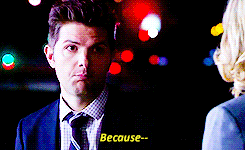
He’s scared of losing Ciel. It becomes apparent with the constant imagery of the Undertaker taking away Ciel and at some point even obtaining r!Ciel’s body, that he’s worried it might happen.
But he can only be worried that Ciel might be taken away if he wants to stay near Ciel.
And that’s his character arc.
Realizing that he actually likes Ciel, cares for him and the role he plays a butler that he doesn’t want this to end.
In the first chapters, he doesn’t feel a need to protect Ciel anymore than what’s strictly necessary. Just don’t die, that’s about as deep as his involvement in chapter 4 gets.
But by the Green Witch Arc, he feels a need to protect Ciel from ANY harm.
This is why I also said
3.- Their relationship is fundamentally a positive one.
In broad strokes, Sebastian to Ciel is the person who allows him to survive. He’s not worried about giving up his soul since he’s already dead. While Ciel to Sebastian, is someone who’s making him have fun. He’s slowly becoming more and more attached to Ciel and the life he has with Ciel.
Their relationship is not that of just a predator and prey, but also of master and pet.
In the terms that Black Butler itself would call: Sebastian is a wild wolf acting like a collared dog.
Ciel is aware that the wild beast will eat him at the end of the day, but if he clings hard to leash for now, he might just be able to have Sebastian maul his abusers.
Sebastian as a dog, currently finds that he enjoys being a chained dog.
(This is demonstrated in the Green Witch arc where he quite literally says, he doesn’t wanna be a wild beast and prefers to be a butler)
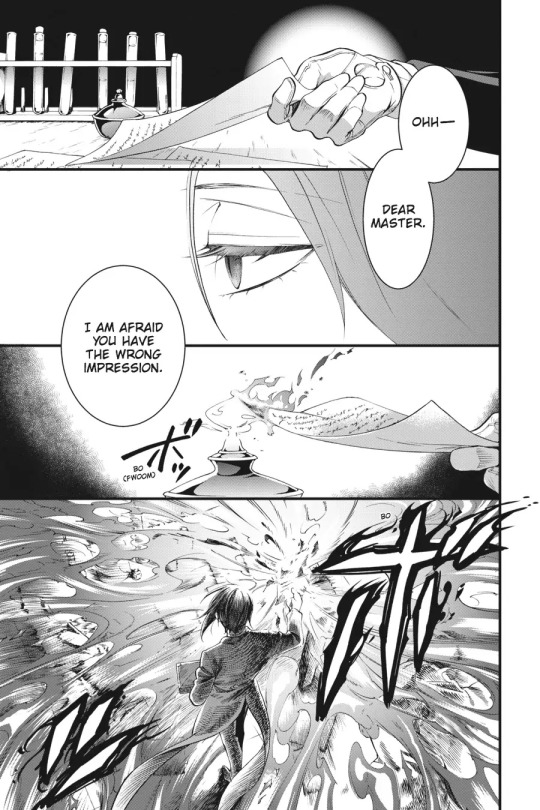
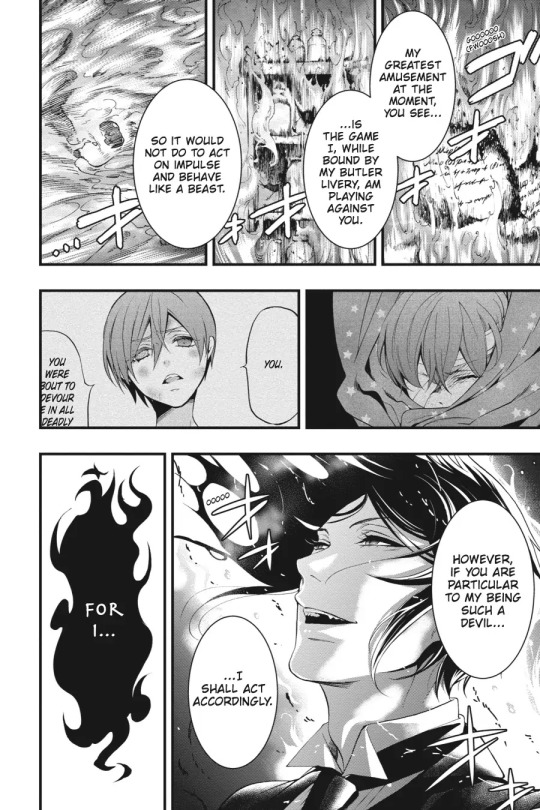
And much like the actual DOG Sebastian, Ciel constantly interprets his attempts to get close and protect him, as an act of aggression.
This push and pull of Ciel’s perception of Sebastian and Sebastian’s true motives is what feeds the story.
And the briefs interludes were that isn’t the case (what other people call the “plot”, but I would refer to as the connective tissue) such as Sullivan and Wolfram, the other servant’s past, the grim reapers and the like, serve as a parallel to Ciel and Sebastian relationship. Either to signify how they care for each other, highlight their weaknesses or fears, or explore how they feel.
It’s no surprise that Sullivan and Wolfram are parallels to Ciel and Sebastian. A sheltered sickly child who seeks the protection of a cold hearted machine that only knew how to kill, but who eventually found he cared for her genuinely.
Undertaker and Claudia’s relationship being heavily paralleled with them, even though we aren’t 109% sure what they had but heavily implied it was a romantic attraction from the undead supernatural creature and a Phantomhive.
Everything is a parallel.
That’s why, like the approach of the terrible original video, is flawed.
Trying to interpret Black Butler as action scene after action scene, with mystery after mystery with the only connective tissue being the mystery of who burned down the mansion - is missing the trees for the forest.
That’s not the point.
And if you’re too much of a prude to engage with gothic horror in its gothic horror game, I see little point as to why you even bother to engage with it at all.
A lot of people, including the person who create the video, simply refuse to acknowledge Black Butler IS the story of Sebastian and Ciel as a close and positive relationship, romantically and sexually charged. The reason for it being that they’re “put off” by it.
Part of me wonders how much that is genuinely true, and how much is just performative outrage. It’s like ignoring the fact that Cersei and Jami are in an incestous relationship and try to frame it as “platonic love”, because the idea of it is THAT off putting.
But regardless of that, if you don’t like the fact that it’s as canon as canon can get, I would reccomend you don’t engage with the story at all.
As I’ve explained, the entirety of the series is about them. If you refuse to see Sebastian and Ciel as, at the very least, a duo that cares deeply for the other - you aren’t reading Black Butler.
I have no idea what you’re reading.Perhaps your own biases and subconscious stigma with British aesthetic. At that point, watch the fucking British Royalty Gossip Magazine. You’d find more substance there.
Just don’t be like the person in the video, please? Don’t play dumb. Don’t ignore the fact that Yana is a Shotacon, don’t ignore the fact Sebastian is a hero, don’t ignore the fact that the entirety of the story is based on Sebastian and Ciel’s dynamic.
Because if you do, you are ashamed. You are ashamed of what this story is about. You don’t wanna engage with the text, you want to engage with yourself. You wanna project into Ciel whatever traumas and experiences you have, for the sake a vanity project, where you come out as the morally superior.
You don’t wanna talk about Black Butler, you wanna talk about how good YOU are. How you “don’t sin” by watching it “without all the gross unholy stuff”.
Which is the exact opposite of what BB is about.
So, if you don’t want to, save us all the humiliation fetish and leave.
850 notes
·
View notes
Text
I think a lot about the Concept of ‘choices that matter’ in video games. Like, in terms of what it is that makes a choice ‘really matter’, what do we perceive as a choice that matters or has a consequence, how do different games with different amounts of branching or non-branching storylines play with those ideas… Especially because Undertale is one of my favorite games of all time, and it has often been hyped as ‘a game where your choices REALLY matter’ and… honestly, I dunno if all of this hype was fully conducive to Undertale. Because the way it handles the concept of Video Game Choices is actually a lot more interesting and complex than that simplistic descriptor makes it seem.
Because Undertale actually has a lot of choices that ‘don’t really matter’! Lots of dialogue choices and silly little decisions that on a first playthrough seem like they’re some sort of moral choice or a branching plotline but end up always leading to basically the same result regardless of what you do!
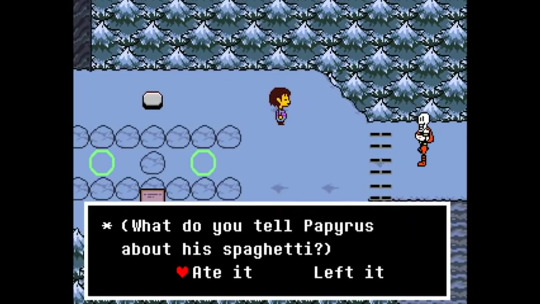
And the game doesn’t really try to hide the fact that these choices are kinda 'Fake'. I mean, on a first playthrough a player might assume there’s gonna be some Massive Consequences for picking the ‘wrong’ drink on Undyne’s date, but the game’s narrative expects for there to be multiple playthroughs and pretty much every Choice that Doesn’t Matter is peppered with that Undertale brand of wacky character-focused humor that inherently makes the moment memorable. Papyrus leading Undyne straight to you no matter what you do is basically a cross-timeline running gag.
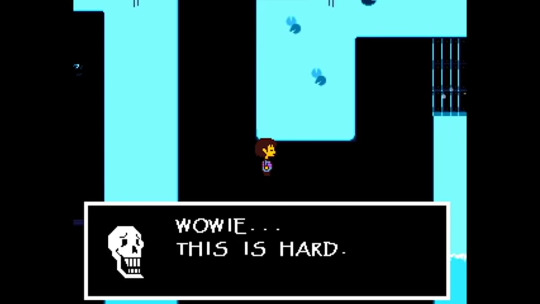
On some level I see this as a sort of gag that serves as meta-commentary about the expectations around Choices That Matter in Video Games. As in, a lot of games have their Moral Choices happen in clearly easily marked ‘this is a Moral Choice!’ moments within the story, while the actual gameplay (and any violence the player might cause as part of said gameplay) is basically entirely divorced from any element of narrative-branching and doesn't effect the story at all. Undertale basically entirely inverts this dynamic; the most important factor for which Route you’re own is how you handle your FIGHTs, and what seems like clearly-marked and obvious Moral Choices are just goofy insubstantial minor changes in dialogue.
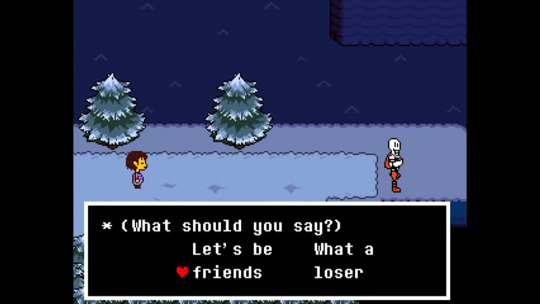
But also… there is also a level where you must ask yourself ‘what does it mean when we say that these choices Don’t Matter’. I mean, it’s not like they didn't change anything about the game, the Player still made the character say that other thing, the choice probably led to an alternate piece of dialogue, probably a joke with a call-back at the end of the game… The line between a one-off joke and an actual story-changing moment can be a little blurry if you look at it too deeply.

For example, near the end of the Waterfall part of the game, the Player is given the choice to save Monster Kid even at the risk of having to face down Undyne.

Pretty much anyone who isn’t deliberately trying to be an asshole is going to rush to save them and obviously that includes the Pacifist Route Players. But you can actually leave Monster Kid to die without it 'mattering' in the sense that it wouldn't divert you from the Pacifist Route. Undyne saves them instead of you, and ends up with slightly less HP for her battle (which might Matter for Runs when you try and FIGHT her but obviously not in Pacifist Runs) and… by the end of the game, during the extremely happy True Pacifist Ending, they still clearly remember that you abandoned them and are upset by it.

So… does saving Monster Kid ��matter’ or not? On one hand, choosing not to save them mostly just changes a few lines of dialogue but… these lines of dialogue kinda recontextualize this happy ending and the Player’s actions in general. Despite the True Pacifist Ending otherwise portraying the Player/Frisk as a kind-hearted and brave hero... they still did this undeniably cowardly (and perhaps even cruel) act to one of their friends .
Was running away and leaving Monster Kid to die a brief but significant moment of weakness that the Player regrets and has cost them what could’ve been the start of a lovely friendship? Or is that simply that being a True Pacifist was always more of a matter of pragmatism rather than ideals? Were they only acting as a Pacifist to get that promised 'Best Ending', and only Monster Kid has an inkling they are not as heroic or kind as everyone thinks they are?
And then there’s the Snowman ‘quest’.
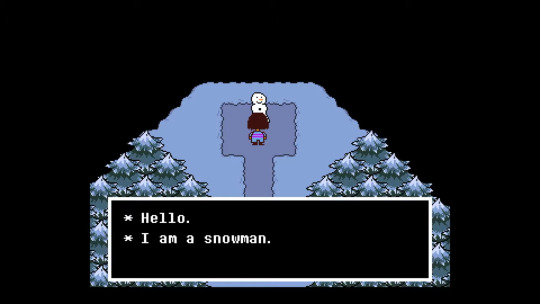
A free healing item given early in the game, with your mission being to carry it along in your inventory for as long as you can without ever consuming it. The only reward you will ever see from it is a few lines of dialogue…

But for many, it is more than enough of an incentive to preserve the Snowman’s Piece. You can do whatever you want with the Snowman without it ‘mattering’ in terms of Ending or consequences. You could carry it through all of your adventures with care and kindness... or you could eat it while he can’t see you and then go back to him and tell him that you ‘lost’ it and then get another piece and eat that as well, you could eat it right in front of his face, horrifying him.

And much like with Monster Kid, you can STILL get the True Pacifist Ending after doing that, all that would change is a few optional pieces of dialogue from the Snowman…

And a total recontextualization of the Player’s behavior and the ending. The Snowman sees the Player as a cruel and heartless person who is just pretending to be good so they can be liked - the way they acted with this immobile, powerless Snowman who could do nothing for them and their reputation reveals their true self. And he says their friends will realize that too one day...
Doing a True Reset on the Pacifist Ending is, by definition, a (almost) consequence-free action and yet it changes future Pacifist Routes immeasurably. Turning the Player into a Hypocrite doing the exact same thing they were trying to stop Flowey/Asriel from doing - trapping all of their friends into a time-loop so they can play with them forever while never actually letting them to enjoy freedom on the surface, simply because they are not willing to move on or put their friends' wishes and agency above their own. Nothing in the game actually changes, not one character can even suspect that you did something like that, and yet for the Player - this choice makes the entire Meaning of the game flip on its head.
Even the most famous and heavily-toted Big Consequence in the whole game - selling your soul to Chara after completing a Murder Route… mostly what it does is just… recontextualize the ending of the Game.
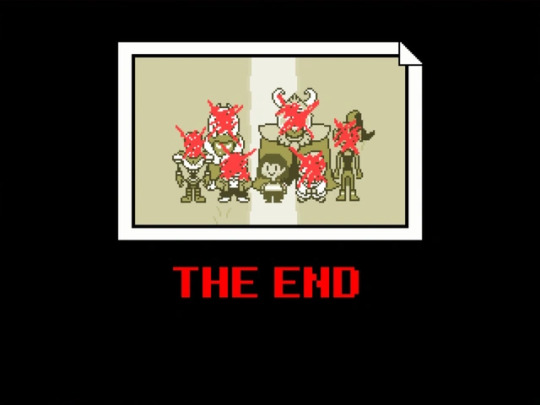
As a game, ‘Undertale’ is very much about the ways in which a Player engages with a game can radically recontextualize it. The huge chasm of difference between the Pacifist and Muder Routes is just the most literal example of it. But, in a way, even the tiny little Dialogue Options - where the lack of real choice and consequences is Obviously a Joke - matter. Because of the way they can recontextualize the Player Character’s behavior.
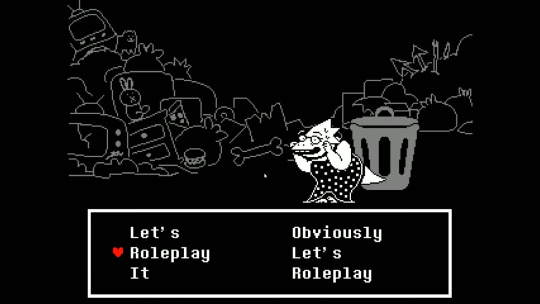
(Okay, maybe not this one, but hear me out…)
Do you trust Papyrus to not betray you, even after you spied on him with Undyne?
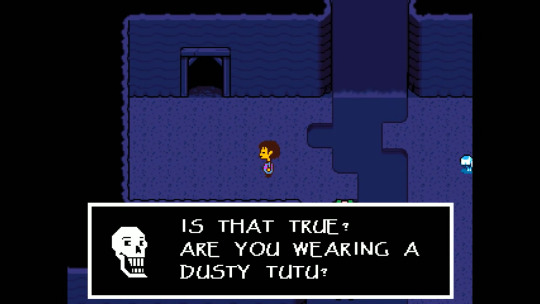
Do you have the integrity to admit you forgot something or got it wrong even when there’s no consequences for just lying about it?
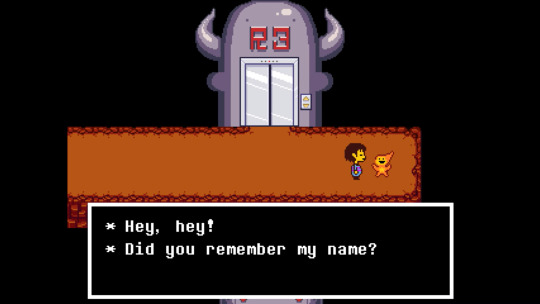
Are you a hypocrite for trying to get Alphys to be truthful with Undyne only to then immediately turn around and lie to Undyne yourself?
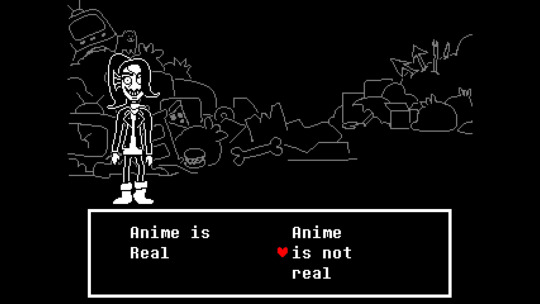
None of these choices matter for the ending, some of them don’t even get, like, a call-back joke or anything, but… if you are engaged in this story as a narrative, if you are invested in these characters as if they were people, if you are honestly trying to be the best person you can be, if you are trying to self-reflect at the way you approach this game… even the silliest little dialogue option can suddenly be imbued with deep implications and you can make them matter.
Undertale is one of the best demonstrations of this concept, but this is absolutely not exclusive to it. For example….
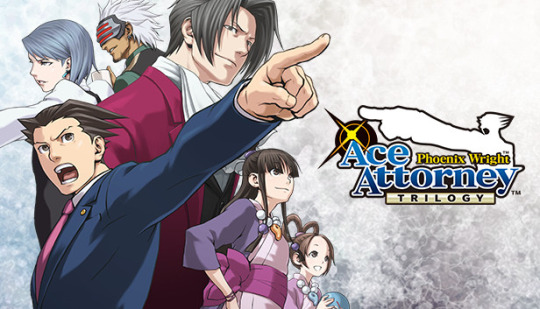
‘Ace Attorney’ is pretty much as far away as you can get from a ‘branching narrative’ within the video game sphere. It is a heavily-linear Visual Novel where 70% of the time it won’t even let you talk to random characters at anything but the exact order it expects you to and any ‘Bad Endings’ are basically just glorified Game Over Screens. (... because this is the Internet and something something piss on the poor, I should probably specify that I am talking about ‘Ace Attorney�� because I love Ace Attorney and these are neutral descriptions of the game and not complaints. There’s nothing wrong with a game being linear.)
If there’s any Dialogue Choice in AA, it’s generally a very basic ‘right answer-wrong answer’ choice between Progress and a Penalty, or a total non-choice that just gets you to the same final result regardless. Except… Well… as we just talked about, getting to the same final result doesn’t necessarily mean a choice is ‘meaningless’, does it?
There’s actually a lot of great storytelling moments where Ace Attorney, despite its otherwise strict linearity, uses this exact sort of recontextualizing mindset I’ve talked about with Undertale to make choices with some really powerful emotional impact…. Even if technically, the ending is the same ending. It can be something as basic as ‘even if picking this Wrong Answer doesn’t get me a penalty, it still embarrassed my character and disappointed my friends/rivals and thus I feel bad for picking it’. Consequences as recontextualizing your character as more incompetent than they should’ve come across at that moment.
And then there’s moments like the iconic ending of ‘Justice for All’. That moment before Franziska bursts into the Courtroom with the case-making evidence and saves the day. The moment where it seems like Phoenix really is gonna have to pick between protecting his best friend and carrying out a rightful sentence.

The player gets to pick between the two options, but Phoenix never gets to say his choice out loud before Franziska comes running in... and yet… he, and the player, still made that choice. Even if no one ever has to experience the consequences of your choice, even if the rest of the world has no idea what Phoenix Wright would’ve chosen if the Miracle hadn’t happened, we know what we picked and that knowledge of the choice matters. Because of how we feel about this choice and what it says about our interpretation of Phoenix… and about us.
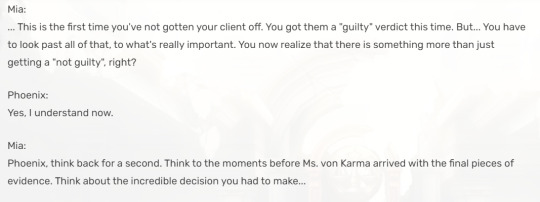

There’s also a bit of this ludonarrative device in ‘The Great Ace Attorney: Adventures’. During “The Adventures of the Runaway Room”, when you investigate the Omnibus for the second time and start finding things that… don’t quite fit together. When you’re finally starting to make progress with proving McGilded’s innocence, while also maybe starting to notice that something is… wrong with these pieces of evidence.

The unchanging linear narrative of the game is that Ryunosuke does eventually realizes McGilded's trickery, puts truth ahead of victory in court and yet, despite his effort and good intentions - the case still ends with a false Not Guilty verdict. And yet, the Player has the choice to... tweak the details.
There are several points where Ryunosuke can object, where he can call out the inconsistencies even though they help his case, where he can support Van Zieks in his accusations of tempered evidence... or he can not. Not necessarily intentionally misleading the Court as much as subconsciously trying to ignore the inconsistencies in the name of trusting his client.

And yet… in the end it doesn’t matter. Maybe Susato calls out the inconsistency instead of him, maybe Van Zieks does, maybe it remains uncontested but... no matter what you do, the case will end with a Not Guilty verdict (I mean, I guess you can deliberately fail the game but that will not progress the plot), McGilded doesn’t seem like he held a grudge (in the few minutes he had left to live), and a few cases later - Ryunosuke would always be punished for his part at this false verdict.
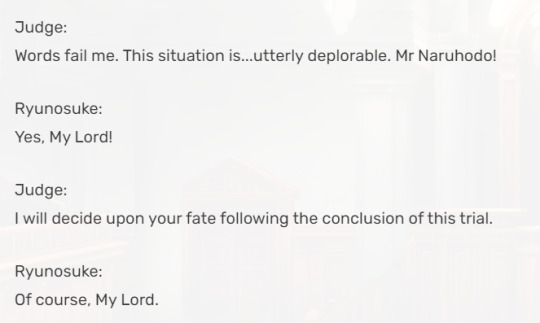
So it doesn’t really matter what Ryunosuke did back then? Does it matter if he did his best and called out every single inconsistencies or if he kinda half-assed it until he (and the Player) had to? He’s still going to suffer the same consequences down the line. And yet….
And yet, I think there’s something so powerful about giving us that option. About knowing that Ryunosuke, and we, did try and do something about McGilded's dirty tricks- even if it didn’t work. Or alternative, knowing that there was more that Ryunosuke and us could’ve done even if it was not nearly enough. Even if in the eyes of the game and the British Justice system there is no difference, the fact that we know what did and what we could’ve done can radically change the way the player feels about all of the later scenes concerning the truth about McGilded’s trial. It can radically change the way the player interpret Ryunosuke’s feelings about it as well.
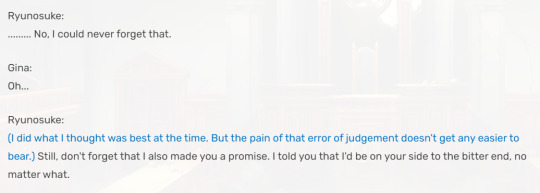
Because even though the game itself keeps playing along with the same script regardless, that trial had irrevocable consequences for the Player.
#undertale#ace attorney#ut#utdr#undertale analysis#undertale meta#ace attorney meta#the great ace attorney#under tale#tgaa#tgaac#dai gyakuten saiban#tgaa1#gaac#great ace attorney#aa2#justice for all#aa jfa#ace attorney jfa#farewell my turnabout#ace attorney justice for all#aa justice for all#phoenix wright#ace attorney trilogy#aa trilogy#phoenix wright trilogy#pwaa#phoenix wright ace attorney#gyakuten saiban
754 notes
·
View notes
Note
The saki glue theory isn’t true?!
I mean it is just a theory… A GAME THEO-
Okay, I’ll stop. But I do wonder why you think that especially since that theory is incredibly popular.
The Saki glue theory, at least from what I've seen, says that if Saki died in middle school it would mean that none of the units in the game would form. The things is, it literally makes no sense if you think about it properly for more than a few seconds.
Of course Leo/need wouldn't exist, because it's not Leo/need without all four of them, and Saki was a key player in mending their friendship. As for Tsukasa, by middle school he was already a theatre kid, so he's not just gonna drop that because his sister died. Yes he would be greatly affected by it but he also wouldn't quit (it's during this point that he actually pushed aside and forgot his original motivations, so he doesn't associate Saki with his dream here). And Tsukasa would still encourage Toya to rebel against his dad, so Toya still meets Akito and they still form Bad Dogs and eventually VBS.
When it comes to MMJ and N25 it becomes really obvious that this theory is grasping at straws. The main explanations I've seen as to how Saki could possibly affect them is that Shiho and Honami become depressed, so Shizuku quits idol work to be there for Shiho, and Honami never becomes Kanade's housekeeper so doesn't call an ambulance for her when she collapsed of dehydration, and Kanade dies.
It just doesn't make sense at all. Yes, Shizuku loves Shiho and would obviously be there to comfort her, but she isn't just going to quit being an idol for that. Shizuku is her own character with her own complicated feelings towards said idol job. She isn't going to drop everything for her sister. And while I think Honami would still become a housekeeper, if she didn't Kanade would just have another housekeeper who probably would've found her the exact same way Honami did. Also at least some people who push for this forget that Shiho and Honami already were not in a great place mentally when Saki was in hospital in middle school. We already have insight into how they coped with losing Saki (not in that sense) and MMJ and N25 still exist despite this. Yes grief is different, but you get the idea.
The Saki glue theory is just a cheap grab at angst rather than anything that actually considers how Saki would impact other characters and their relationships. Yes she does affect some characters but she is not going to drastically rewrite the narrative if she dies nor will everyone close to her become too depressed to function. If we're being really, really, honest, you can kinda tell this theory probably exists partially to give pointless angst to her brother, which is a whole separate issue.
Like, Saki is important to some characters don't get me wrong, but she's only important to the narratives of four, those being the other members of Leo/need, and Tsukasa. She absolutely does not affect every character in the game, even by proxy. Chart:
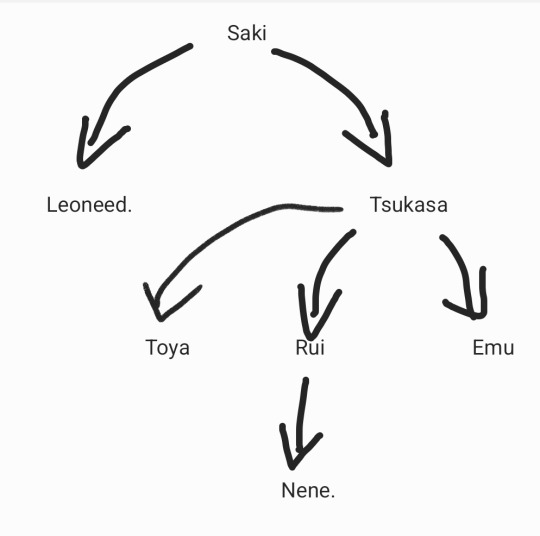
I'm not saying angst in fandom is a bad thing, and it can be interesting to explore darker and more negative themes/emotions with characters who don't get to experience these a lot in the source material, but within this fandom there is an issue with pulling out nonsensical explanations for dark stories, which like 50% of the time involve killing off the chronically ill character. And a lot of those are to write angst for her brother and ignoring what actually is written in canon about him and his relationship with Saki. Ableism and misogyny with one move. Real nice.
171 notes
·
View notes
Text
¡Shidou’s hcs and character analysis!
tw// childhood trauma, violence, reference to possible SA in his past, my writing cause I didn’t proffered this
PHYSICAL TOUCH!! Friends, lovers or even just acquaintances, he has the bad habit of seeking touch, small or big doesn’t matter. From shoving to fidgeting. It’s different obviously base on the relationship you have with him. Are you two friends? Expect playful shoves, ruffling each other’s hair, if sat together legs or shoulders will touch casually. He is the type of person to laugh and slap your shoulder while laughing.
If you two are lovers: hand holding (he does that thing of rubbing his thumb on the back of your hand), kisses, hair ruffling, legs intertwined, hugs from the back, nibbling/biting. Pressing his forehead against yours. SQUEEZES. Especially if you have more fat on you, he would *love* it. The need to hold you close and squish your rolls or chub.
I personally see him as unlabelled. I know a lot like to hc him as gay. And it does make sense, but one can flirt with guys and it doesn’t erase the possibility of being into women too. That said, I do believe he has a preference for guys, especially aesthetically, but ultimately his choice of a partner would be base on mental compatibility and aesthetic attraction, no gender. I feel he is into someone who truly enjoys being their true self and doesn’t conform to society norms, more on this in a sec.
He is complex, as we see glimpses of this in the “egoist bible” and during his internal dialogue (like in the U20 arc). I don’t think he would be a bad boyfriend, but neither would he be perfect. Objectively speaking, he does have a rough, almost explosive side. But that’s a side he brings onto the football field. How he is outside of football we don’t really know. He is shown to be someone who values uniques, and also strength, complimenting other players strengths. He is not a demon, he just so happens to be a human with a deep complex personality. He seems to value peace in his life outside of football, which is something you don’t expect from him. Because he gets presented as this brute individual and yet he is the same who pops out this answers: “What made you cry recently?” At the end of the day when I become nothing, tears come out.
“What will you do on your last day on earth” Watch it as it reaches its end
“How would you spend your day off?” Be free from everything and become nothing
His answers are, intense, are they not? Which leads me to several thoughts. 1) He is very lonely. Using humour and anger to defend himself, a common trait of children who were abused, neglected in their childhood.
2) base on this, I feel in a relationship he would enjoy someone who has similar vibes to him but ultimately is different. Someone he can be chaotic with, someone he can laugh as loud as he wants, someone with who he can gossip and still have deep conversations at the same time. Ultimately, an artistic partner would be the best. Not only because he is into art, mostly as a way to cool down and shut down his brain, but because an artist or even a writer can see the world under different shades of colours rather than in greyscale. Classical introverted x extrovert duo, with the exception that the introvert individual becomes as extrovert as him when they are alone. His partner is his ancor. He will need to feel at peace from the turmoil inside of him.
3)his home life was not the happy kind. Now, this has been long speculated and I will give my 50 cents on the matter. Let’s analyse his favourite movie, manga and song:
Music > hide. Especially "Pink Spider"
Movie > "A Clockwork Orange"
Manga > "Chainsawman"
On the base line all three explore the darker sides of humanity, the need for personal freedom, and the consequences of defying societal norms. They create a raw and intense narrative about self-destruction, survival, and transformation.
But if we dive deeper > the movie mainly depicts SA, it’s a twist mix of violence, societal injustices and lack of free will… “Chainsaw man” it’s all about violence, power imbalance and manipulation. Denji was a tool from the start to end (again, lack of free will). The song, explored themes of internal chaos, the darkness in humanity, destruction and emotional turbulence and the psychological tool that that violence and abuse leaves on people. I mean… can it be any more obvious? His whole character is shown to be this brute, rude, violent individual but slowly we are being feed details into his insight. Like how deeply philosophical he is, artistic and yet he is genuinely over sexualised. Maybe is a reach, but I don’t think that movie, the song and the manga choice are casual. They are a mirror image into the possibility that his childhood was pretty much terrible. That his sexual comments, which come off as almost distasteful, and feel icky in a way, are a projection of what he went through. Trying to use a distorted sense of humour and the violence he grew up with, to shield himself from what’s his personal life and past.
Like when he was locked up, his reaction was intense. He was close to begging to be set free. Again— lack of freedom, he hates not being able to be free. Something could have been taken away from him in the past. Maybe is as simple as a culture thing— as we know Japan is a rather modest country with certain unspoken rules. Its traditional outlook on things such as gender and sexuality are the total opposite of Shidou’s persona. His appearance is loud, his personality is loud and it alls screams “look at me I’m here” and yet at the end of the day he is still a lonely being.
I recently reread the U20 chapter where he enters on the field. His inner monologue he uses biology (specifically fertilization) as an analogy to scoring. Many people interpret it as him making a connection to sex, but for me, it didn’t read as such. Maybe it’s my literature student nerd ass, but, I took from his inner monologue a sense of need in terms of leaving a mark onto this world. He speaks how art leaves a mark, so does books, buildings and obviously children, showing the family legacy. Proof that something existed before them.
Shidou feels that his legacy, his needs, are validated through scoring. He feels seen, people are cheering. He is leaving a mark. Which ultimately could be validating a lack of emotional attention he received when he was a child. To me, all of these references and the constant sexual innuendos are a meaning for something deeper. We saw how each character with a heavy backstory has a trait or something in them that screams “something is not right”. Like Rin’s personality being a result of what happened between him and Sae. Can’t think of anything else to add, maybe I will add something later. If you have any opinions, I am more than willing to read them!! Feel free to reblog/comment :))
#Glamourscatwriting#blue lock#shidou ryusei#shidou x reader#blue lock shidou#bllk shidou#shidou headcanons#character analysis#character angst#blue lock headcanons#bl Shidou#headcannons#my headcanons#anime and manga#blue lock manga
177 notes
·
View notes
Note
I have been thinking about both Wille’s and Simon’s character progression throughout the series and I have realized that it sort of looks like Wille has a pretty good character progression and has been pretty profoundly affected by Simon and their relationship (in a good way). But I don’t really see any of that for Simon. It sort of look alike he has had more things “taken away” by their relationship. He has lost his privacy, and gets hate to the point where he has had to delete his SM and he gets a rock thrown his window. In a way if they hadn’t gotten back together, it looks like all Simon would’ve gained from this period is trauma. Do you think he gained any positive things from this relationship (in the case they hadn’t gotten back together)?
So I’ve spent a long time thinking about this since you sent me this and I have a lot of thoughts about it, but they’re kind of all botched together. Hopefully I do a decent job explaining myself:
In my opinion, Simon definitely has an arc, it’s just more subtle and not as “flashy” as Wilhelm’s. This is genuinely fine with me for multiple reasons: 1. Simon just isn’t the main character of this story - Wilhelm is. So he’s not going to be the one to go on a life-altering journey 2. Simon, narratively, functions has the moral compass around which Wilhelm centers his life around. He’s there to push Wilhelm into embarking on this life-altering journey.
That being said, Simon’s story arc is really simple and very personal, but no less beautiful. We start in S1 with Simon being loudly himself, and Wilhelm adoring him for it, but this quickly becomes an issue - namely, Wilhelm starts to lowkey take advantage of Simon’s generosity and kindness, and ultimately betrays him. Which is why we get that big argument with Sara where she accuses him of “letting people piss all over him.”
Moving into S2, we see a Simon who’s taken that conversation to heart - he’s firm with his boundaries, he doesn’t want to give Wilhelm a second chance, he doesn’t want to forgive because he thinks Wilhelm isn’t sorry. Then, he has another conversation with Sara, where she basically tells him, hey, love is crazy, it makes you do crazy things. And yes, she’s projecting here, but once again, Simon takes her words to heart and decides to follow his feelings. He essentially “gives in” to his love for Wille and decides that no matter what, he wants to make this relationship work because he’s in love, damnit, and he wants to be with Wille no matter what.
And this is the mindset that Simon enters S3 with. That’s why we see him making himself small and trying to appease everyone. He’s just so in love, and he wants it to work so badly, until he just can’t anymore. Notably, he doesn’t end things for his own sake - he does it for Wilhelm. He sees that being with Simon is hurting him because it’s allowing Wille to use him as an emotional crutch and stay stagnant in life. So he leaves, starts to close himself off again. And then - dun dun dun - he has another conversation with Sara. He tells her, damn, you were right, I need to stop being a pushover and she shoots back with no Simon, YOU were right, we should give people second chances. And thus, Simon gets out of the car and gives Wille one more chance.
So what does Simon gain out of all of this? Basically, he’s learning to trust himself and his feelings. His entire arc is him basically learning: hey, my morals were right from the start! This is how I want to live my life! Which makes sense really because this is the role he’s playing in Wilhelm’s arc. And it’s not a particularly sexy discovery, but it’s a really powerful thing to learn, especially in your teenage years.
As for specifically Simon’s relationship with Wilhelm and what he gained from that outside of his arc: Wilhelm adores Simon for exactly who he is. And I think it’s a really profound, valuable thing to experience what it feels like to be loved and be in love with someone who really sees you and wants to stick by you through thick and thin. In many ways, Simon has always had to earn love, but he never has to earn Wilhelm’s love. And that’s kind of life-altering in and of itself - to know that love like that exists and that you are deserving of it.
But what do I know fr 😭
161 notes
·
View notes
Text
started to go on a tangent in the previous post but something I wish we could have seen in Campaign 3 in much more detail is the stories of parental abandonment and the way people mythologize those absences, because it's a throughline for Imogen, Fearne, and Ashton and to an extent Chetney. I think Fearne's is the most realized by far; she realizes that her parents were manipulated, but also that her ideas of them were nostalgia, and she develops a closer relationship over the series but it's still very marked by distance that would not have been there, had she been raised by them. Ashton's is rather frustrating, in that their response immediately post Shardgate was incredible: they realized they had been hoping, despite all everyone had said and every sign to the contrary, that their parents were visionaries and something just went wrong, but no, their parents did a cult ritual with a child present because they thought they were destined for greatness, and it went to shit, and had it not and had he stayed there he would have become a cruel person. It's frustrating because that realization seemed to utterly vanish a few days later in-game but the initial exploration was excellent.
And then there's Imogen and Liliana, and I think what gets me is that sure, Relvin lying was not a great choice on his behalf despite there being no ill intent behind it, and indeed had he told the truth, that Liliana left when Imogen was a baby and never sent a single litter for over a quarter century, I think the story would be very different (and, in my mind, better). But Liliana was unambiguously unhelpful and antagonistic, consistently, until Imogen managed to sway her on Ruidus based on a lie (that she didn't know about the assassination attempt) (I do not blame Imogen for lying about this, incidentally, this is about Liliana ONLY becoming helpful when her daughter withheld the truth from her for her (Imogen's) own safety). And it's just...I think a lot of fantasy narratives go too far in the other direction, of "fuck them, found family only, no contact immediately" but Liliana didn't do jack fucking shit for Imogen for years and months, and at what point do you give up on the myth? Again, why does Imogen care so much about this woman? Zathuda is a fucking horrible asshole, and I like the Gentleman but he's certainly not a good person, and somehow both of them managed to realize that given that they'd been absent for their children's entire lives they are parents in a biological sense and little more.
That doesn't even mean it's bad for Imogen to make the choices she does; it's just, I'd like to have an understanding of what is making her say "ok, absolute jack shit in 28 years plus untold harm to the world at large is fine because of two or three things in the past few days", and I've never felt like we've gotten anything but "but she's her mother." And two other characters in this campaign (and many in past campaigns) have at least for a while explored why that's not enough.
157 notes
·
View notes
Text
Was Donovan trying to read the mind of his family members ?
Like some fans, I believe Donovan's scars on both sides of his forehead (which he didn't have as a kid, as we know thanks to Henderson's flashback) are proof that he had some sort of neurosurgery.
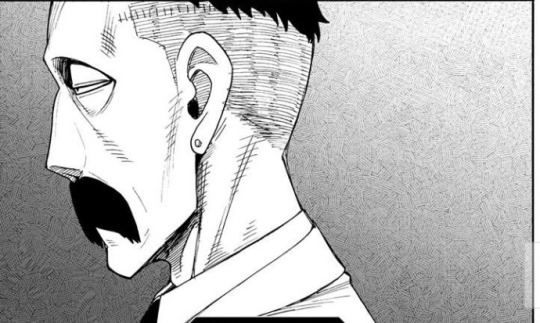
Some fans say it was to suppress unecessary emotions : he indeed only ever reacts neutrally, positively or negatively, using a few basic emotions like judgement, acknowledgement and disappointment (both in ch106 and ch38).
However, I'm also of the opinion that Donovan has a big link to the organization that experimented on Anya and maybe that neurosurgery was meant to give him "mind-reading" powers, similar to Anya's.
After all, he did say two things of the utmost importance to his characterization :
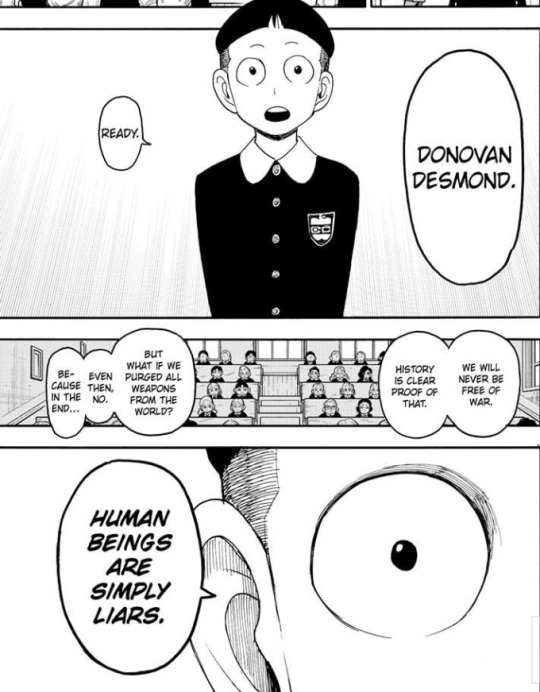
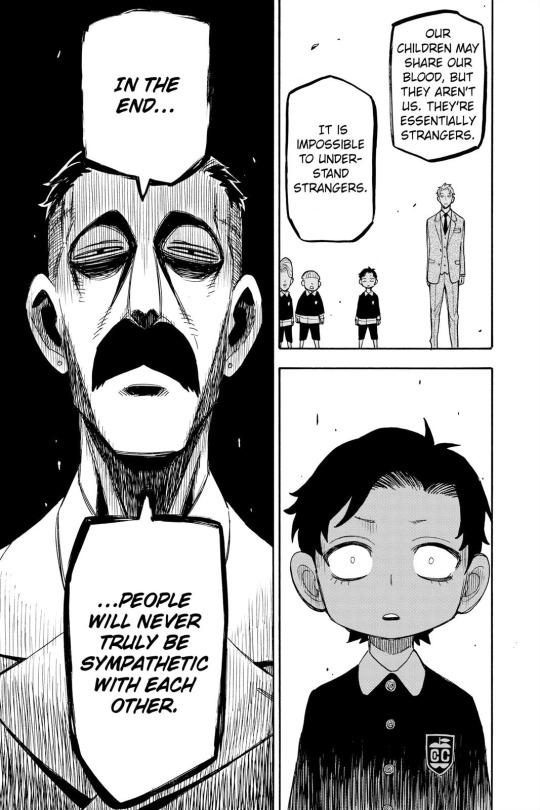
So basically “you can’t trust anyone but yourself”.
As such, thematically it makes sense that he's Twilight's entire mission, but also, as a man with so much distrust, he would definitely be interested in a project that would allow a peak into other people's thoughts.
Demetrius is also a good hint as to what could be up with Donovan :
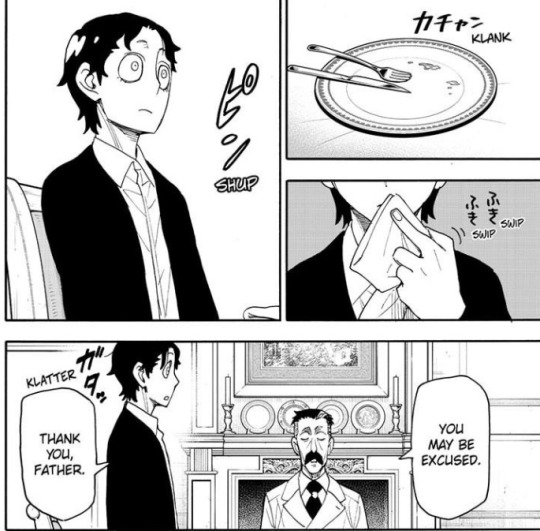
The son Donovan used to be so invested in seems very similar to his father (my God, his eyes), but when Anya tried to hear his thoughts ?

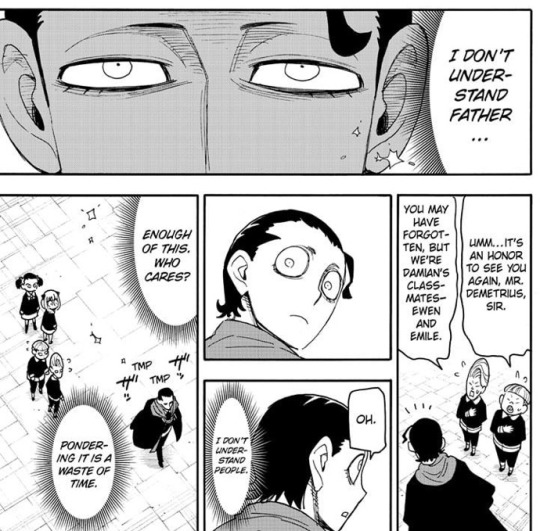
What she rather got was that "pondering [about not understanding people] is a waste of time" for him. So maybe, when they used to spend time together, Donovan showed a lot of distrust towards his own son and taught him to trust no one, so much that Demetrius started to believe all people are an enigma to him.
And that makes sense : children learn from their parents' example, in most cases (take Anya with Twilight and Yor). So if your father is a man who hardcore believes everyone else lies, how would his son understand all the moratively complex dynamics that exist between many people ? Avoiding to think altogether would be less of a headache, for sure.
Lastly, Donovan's reaction about the family dinner is another good hint he maybe has mind reading powers : Melinda tried once to chat but quickly gave up, while Damian spent the entire meal mustering the courage to speak up, so what could decidedly be interesting since nothing was said ?
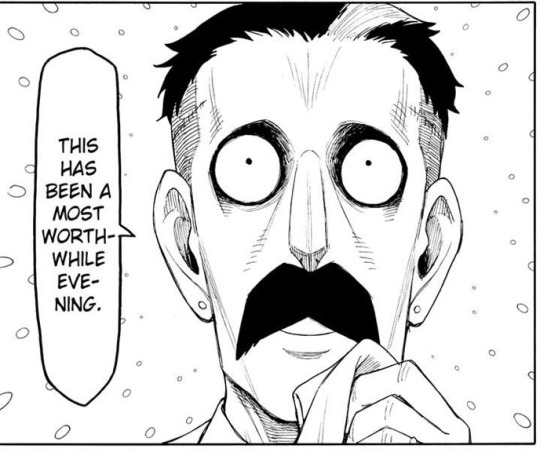
However if things were thought during dinner... well, it sure would give a different reading to this scene.
Bonus #1 : since Twilight's entire life is based on a lie (his name, his work, his family, maybe even his father, who knows), it makes absolute sense that the entire plot is about deciphering what Donovan and his plans are about.
The fact he keeps on getting emotionally trapped by four year old Anya, who can read his mind, makes it instantly ten times more intense if Donovan now also has mind reading powers.
Bonus #2 : the only other important character in the narrative, besides Anya, who is aware that mind reading is real is Damian.
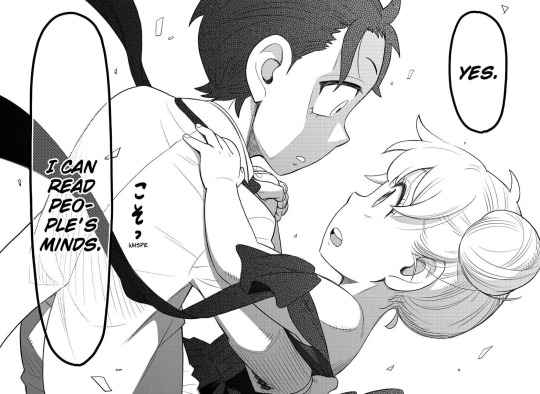
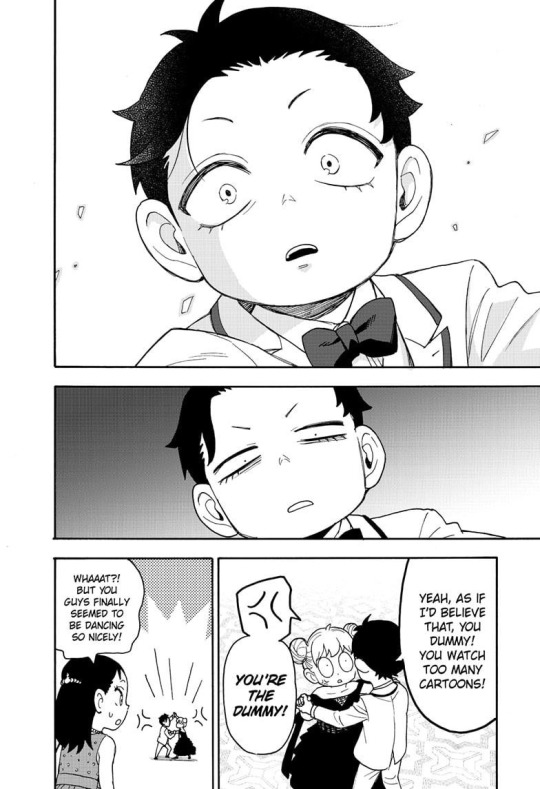
He doesn't believe in it yet, but once he does, it's likely that his friendship with Anya will eventually make Damian realize a lot about what his father has been up to (in the meantime, Yor please, give Miranda the desire to fight for her sons' safety).
TL;DR maybe Donovan has (recent ?) mind reading powers (I'd even add Sigmund Authen's past as an esteemed neurology professor is related to the whole shenanigan).
The family dinner was just a way to make extra sure that no one in his family is plotting against him, hence the bodyguards at home, because how more dysfunctional can it get ?
#spy x family#donovan desmond#damian desmond#anya forger#loid forger#demetrius desmond#melinda desmond#sxf106#sxf theory
256 notes
·
View notes
Text
Counterpoint (or maybe not?) about Chi-Chi. And not at all defending the behavior, because I do see it for being problematic, and I have half a thesis on its presentation, but I kinda want to just do Scholarship about what's immediately at hand, so here we go:
She's a warrior, too. Y'all remember how Teen Chi-Chi the Ox Princess got out her 1988 boom box and played the Proclaimers on repeat and like... punched boulders for MONTHS going, "Well I-IIIII would 💥 500 miles and I-IIII would 💥 500 more..." and then fell asleep every night to Zombina and the Skeletones singing"Gotta Be an Ape Man?" on her way to that big tournament? Y'all remember that?
If Goku grasped her wrists like the tender bird bones she has now, compared to him being a little god snoozeville years ago, she wouldn't feel POWERLESS, necessarily. She'd feel PISSED. On a whole different entire level.
Because he was like, "Don't hold back, mystery warrior! Don't be wack like that at a TOURNAMENT! Show me what you GOT, bay-beeeee!!!"
And yeah, he waxed her ass and won the tournament. But she got the prize she came for, AND he acknowledged her as a WARRIOR.
Now she's outmatched by literally everyone and everything they come up against, and even Bulma's got better guns and ammo, guaranteed. Even the toddlers can fucking fly.
And no matter how hard she hits, her Ape Man won't listen to her even 2% as much as he listens to fucking VEGETA, and he don't even unstop his big ol' ears half the time when the Prince of All Giant Ears is like, "kakarot wtf u goddamn imbecile, we JUST flipped the counter to 4 yrs since last kakarot died, don't u want a PIZZA PARTY, kakarot??? THINK OF THE PIZZA, WE CAN GET 3 TOPPINGS, KAKAROT -- NO! FIVE!!! FIVE TOPPINGS, BULMA WILL PAY FOR IT, KAKAROT NOOOOO!!!!!"
He doesn't see or hear her anymore; she doesn't speak his language on any level, especially not the one that matters to him most, in a distinctly Goku way that I have a whole other Thesis about. Or she's TRYING, but she still speaks like... Ancient Greek, and he's on Cyberpunk Cyri11ix 2.6, so they can't communicate at all.
And he holds her like she has bird bones. Because to him and everybody else in her circle, she does.
She could throw a fucking oven at him and he'd be like, "GAAHHH, SHE'S SO SCARY!" but she's not scary enough to stop him flying off and taking the kids with him to maybe go get killed again, or whatever, who knows?!
Again, not defending the behavior. I do find their dynamic both insane and tragic and DEEPLY sad in a really layered way, and I admit that that's more than two things, but that shit is complex and I can't stop thinking about it.
- Bulma bitchslaps her family. She is a violent and angry individual. Vegeta cant do anythinf about it obviously. Bulma doesnt really slap her daughter. She absolutely slaps her son
- If Trunks has the gall to raise his guard and resist the effect of his mother's slap then he gets in even MORE trouble. He HAS to just take the whiplash. He has to take the abuse or he gets grounded for daring to defy his mother. Also Vegeta will get on his case about it. Discipline and responsibility over ones power are very big lessons that Vegeta is always trying to teach, and he needs to make sure that his son understands that taking the hit is not as bad at Bulma breaking her hand on his titanium jaw.
- Chichi beats her family. Unlike Bulma, she will utilize tools. She will chase you down with a cast-iron skillet and then get mad at you for making her run.
- If shes running after you and she trips and falls then you have to go back and help her up becasue she is frail and she is your mother/wife, and then once shes on her feet she can beat you with better clearance
- She will break the wooden spoon on you and then send you to the market to buy a new one (since you broke it).
- Piccolo used to beat Gohan so he and Chichi have that in common.
- Both Goku and Vegeta know the experience of being across the house and then hearing the distinctive crack of your son facing the decisive reckoning of his mother
- Both Goku and Vegeta face the violence of their wives, but Vegeta will honestly just grab Bulma's wrists until she calms down, becasue he is too prideful to run, and just raising his guard is a wildly offensive affront to his nonwarrior wife. Bulma is still offended that he does that but thats just what needs to be done. Goku is not allowed to do that, but he will do it anyway, or he will run away or just get hit. Chichi gets so angry at him if he doesnt take the abuse becasue she feels powerless in their relationship and it's tantamount to him ignoring her completely.
- Chichi is kind of racist toward saiyans. If you bring up the fact that she beats her family she will be like "That's just what you have to do with those Saiyans! It's the only language they understand!"
#chi chi#character analysis#gochi#they have a fucked up dynamic#and i can't stop thinking about it#fucking tolkien level tragedy#i said it#i'll say it again#i stan chi chi#not that i think she did nothing wrong#or does nothing wrong#she does#a lot#i just think there's nuance to it that leads the chain of what's going on in a way that makes narrative sense#and it's fucking SAAAAD#which is one of my favorite sauces for entertainment media#absolute mushroom vinaigrette of a condiment#she's almost as sad as vegeta#never mind it's not a contest#i love putting the 2 of them in the angsty spotlight if i'ma write a angsty polycule thing tho#goddamn they got a lot of weird shit in common when it comes to goku#anyway#absolute scholarship
53 notes
·
View notes
Text
I find the general idea of Stolitz being “toxic” to be fucking hilarious. It’s thrown around so easily like it should be accepted that they fit this definition and….they really, really don’t lol. Like they have a pretty chill and common miscommunication and personal issues interfering with wants and desires conflict. Like I cannot stress how fucking chill it is. They don’t actively hurt one another intentionally, neither are trying to murder the other directly or indirectly, they are not on opposing sides of a larger external conflict save for inherent world class dynamics, they don’t manipulate each other or work against each other, etc. They say hurtful things and argue and are oblivious to the other’s issues but like, in a fairly normal neurodivergence and historical trauma driven way.
They do begin with a mutually agreed upon transactional sexual dynamic, which is often the crux of these “Stolitz is soooo toxic” arguments to the point the really intense anti’s cry SA. A transactional sexual dynamic Blitz was so okay with when it is no longer agreeable to the other party, and they communicate that and change the parameters in a way that gives him full autonomy, he spends half an episode trying to return to that dynamic. Much trauma. Very coerced. 🙄
There is a power imbalance but it only exists in the sense that one person is societally more powerful by nature of his birth and ignorant to it by nature of his upbringing. Stolas does not force Blitz into said transactional sex dynamic by exerting his power or influence so it’s largely irrelevant save for how it impacts Blitz’s personal self worth issues and it is never from a place of malicious intent. Which is what matters in media? Character intent and decisions are literally the crux of the narrative?? Stolas figures out it’s a problem for the type of relationship he really wants to have and corrects it and even goes above and beyond to ensure that Blitz will suffer no fall out from his choice if he decides to not pursue their romantic relationship further. Like, toxic WHOMST? Just, don’t talk to me about toxic until they get hot and bothered about how well the other tried to actively murder them. We have had zero poisonings or major betrayals in this ship and ya’ll throwing around toxic like words have no meaning.
“But he called Blitz his impish little plaything! He thinks of Blitz as a toy! As a sub-species!” Or maybe, just maaaaybe the sexually inexperienced character who is making shit up as he goes along based on his canonically identified incorrect perceptions of what the other wants/likes as well as ignorance of his own power and position thought he was just being sexy and cute? Just maybe? Like can we apply a smidgeon of deductive reasoning based on the sum rather than the parts? As a treat.
It just speaks to what I have observed as probable immaturity/lack of life experience driving a lot of the criticism or straight up vitriol regarding the show’s major conflicts. A very black and white application of moral purity that deems anything not rainbows and sunshine as toxic and where the ultimate goal is some nebulous and frankly hella ableist concept of “healthy”.
A similar thing plays out with regards to Octavia and the classification of Stolas as a “bad parent” because he is pursuing a relationship and has issues of his own to deal with on top of parenting. Heaven forbid a closeted gay man raised in isolation going through some late in life awakenings is not perfectly navigating an ill defined relationship and a divorce and raising a child on top of his myriad of mental health issues. What gets me the most is she’s not even a young child, she’s 17 possibly even 18 at this point in the timeline but the way people act he abandoned an infant at a flophouse to get his rocks off with someone who fears he will smite them down with his incredible Goetian might and if they refuse they’ll be living out of a gutter eating dirt because they wouldn’t perform sexually for him. Instead of the in-universe reality where the most egregious thing Stolas has done is fail to consider his daughters perspective and how this impacts her, made some inappropriate sexual comments really early on in front of her when he was still excited, and forgot, during a major life upheaval, a promise to watch a meteor shower he made to her like a decade ago. He didn’t even forget the promise itself, he just forgot what day it was. Like I forget shit I promised my kids last week much less when they were like 5.
Like there is such a huge disconnect between actual toxic behavior portrayals in media with regards to relationships and parenting, or hell toxic relationships and parents in real life, and what is going on in Helluva Boss. This is ignoring the fact that the actual universe of the show, which is what should be the metric when examining character dynamics not reality, has established real toxicity in both relationships and behavior, and has shown us time and time again how that toxicity contrasts with our characters and their relationships, be it Stolitz or Fizzmodeous or Moxxie/Millie or the parenting dynamics of Blitz & Loona and Stolas & Octavia. We have examples of toxic relationships, and we have examples of toxic parents in this world and we’ve been shown that the relationships of the main characters is in opposition to them.
But even if you were to take the, imo incorrect, position of applying real world considerations to fictional worlds it still doesn’t track as toxic.
Do you realize how many sexual transactions and power imbalances occur in relationships everyday as just a matter of course?
Like “I’ll wear that outfit you like if you do this for me?” Normal, Transactional. Accepted straight couple in a sitcom premise. I would wager “I’ll preform this sex act if you do X” is said in one way or another without anyone batting an eye a hundred times a day. And that’s ignoring the implication that transactional sex is inherently problematic. It isn’t, it’s the coercive aspect that is an issue and even then we get real handwavey about it in reality when the situation isn’t explicitly coercive.
“I’m a police officer/government agent/politician/media influencer/sole household income earner that has the ability to fuck up your entire life/reputation/financial stability just by nature of my job and how well we are getting along” is perfectly fine and normal. No one would suggest that a police office or government agent can only be involved with someone of equal systemic or social power in reality. Do my partner and I have a toxic power imbalance because I am the sole working person in our household and they are a stay at home parent and I hold all the financial power? No, that’s fucking silly.
Not to be all “sweet summer children I grew up in the trenches of toxic” about it but it’s the most baffling part of this fandom that a pretty low key conflict and relationship dynamic, where neither party is actively trying to hurt the other and has approached the entire thing from a place of earnest confusion and ignorance and is working through it in a pretty normal way is classified as “toxic”. Get back to me when they are poisoning each other, have killed several of each other’s loved ones and there is necromancy involved.
270 notes
·
View notes
Text
you know, i said that kabru's storyline in dunmeshi follows a typical "idealist in materialistic story" trope and doesn't subvert it in any way, but i've changed my mind. i think it goes a little off the beaten path and it's what makes it interesting.
the thing is, stories usually are very unkind to characters like that. so, you're an idealist? how about putting you into the worst situation in your life, make you beg for food and shelter, drag you through the dirt to make you realize the truth of material? but dunmeshi isn't unkind to kabru. yes, it puts him into "the situation", but reality is, it's not unkind to him at all. kabru is interested in people, so what story does is making him see the value of material through his connection to another person.
doesn't mithrun exist in some form of idealistic perfection, where you quite literally don't care anymore about eating or sleeping and only focus on your one goal? when it's only you and the purpose born purely by your mind? isn't it the sort of existence kabru would want in the pursuit of his own goals? since he himself prefers to ignore the material, possibly even sees himself above (beneath) it all? it's interesting that human desires, as it should occur to kabru, are on the edge between material and ideal, it's a part of being human in the first place.
and well, what kabru quickly realizes by spending time with mithrun is that this sort of existence is harsh and cruel and dehumanizing. as much as kabru would like to think otherwise, to have meaning is "to want" and to acknowledge that "want" instead of denying it for greater purpose. and to acknowledge that "want" you need to fully accept your own humanity.
in some sense yes, kabru is forced to confront material, but he's not hurt by the process. he helps a person, makes a friend. he finally has a few good nights of sleep, he eats, he thinks about eating better food. he has a chance to share his memories and culture. he can talk through some of his concerns with the person he has no reason to put his facade for. kabru literally has a slightly stressful vacation and reconsiders a lot of his view in the process. and yeah, as much as i enjoy it when the narrative is cruel to its characters, i loved this a lot.
because dunmeshi is the type of story that wanna be materialistic in the positive sense, not in the negative, the lacking sense. it's not the story about hunger, but about satiation. so, it doesn't show you a process of breaking and isolating someone to bring them down to their humanity, but it heals them and gives them community to accept that humanity as a good thing instead.
177 notes
·
View notes
Text
There's not really a point to this. I'm not saying Arcane is bad or you shouldn't watch it or you shouldn't like Jayce or jayvik... I'm just feeling annoyed at the way they took Jayce's character in the second season for a lot of reasons & I want to rant about it.
Starting with the whole scene of Jayce & Mel talking by comatose Viktor. Jayce says "never again" to making hextech weapons & Mel promises to protect his & Victor's dream. Then, 30 seconds later, Jayce makes Caitlyn more hextech weapons anyway! His wishy-washy promise wasn't surprising, just annoying that he'd make the same mistake AGAIN (Then a third time to defend Piltover from Ambessa's attack).
-
Later, in seeing the whole story, we know that Viktor sent Jayce back to teach himself some life lesson. So why was Jayce's first reaction to kill Salo & blow a hole in Viktor's chest?? Shouldn't he have tried to reach Viktor in a less murdery way first? Try to reason with him & teach him said life lesson? It just doesn't make sense.
-
After Jayce gets back to Piltover, he has this sudden resentment & distrust towards Mel. Where did that come from? Why does Jayce suddenly think Mel is an enemy?
Jayce starts accusing Mel of selecting who she protected. What would she have to gain from that? Even if Mel DID know she had powers, why would Jayce think she would willfully let the council & Viktor die? Why would he think her so cruel?
Then there's the "investments" line. Firstly, it was Alora that called Jayce an investment. Mel just said, "Indeed." Secondly, Who the fuck told him that happened anyway??
Then Jayce claims Mel was "using" them? Yes, she wanted Jayce & Viktor as allies & directed them in her favor, but thats really not "using" them. She saw a good opportunity to make some change & took it like anyone else would. The rest of the council used him for their own benefit far more than Mel did. But more importantly, Mel CARED about Jayce & Viktor. She cared about their dreams & helped them to achieve it! She was the one who supported them from the start. She was trying to get the council NOT to make hextech weapons. She wanted to protect their dream, but she's still somehow "using" Jayce & Viktor to get hextech?! Jayce is the one who keeps making hextech weapons without anyone pressuring him to do so! So what was the narrative point of having Jayce take his regrets out on Mel? What function did it serve?
That whole scene was just-
Mel: Hey, I need some emotional support from this traumatic thing that just happened to me
Jayce: Fuck you, Mel! You should have saved everyone. Also, how dare you have unconditionally supported Viktor & I & our research!!
The anger towards her just comes out of nowhere & has no evidence to back it up & it annoys me. Also, it just feels out of character, even with the more edgy way they portrayed Jayce in act 2 & 3. So, just, why?
-
Then there's "my partner died in this room." Jayce saw Viktor in the future, as himself, not the machine herald. He spoke with him & promised to fix things. So clearly, Viktor's humanity wasn't dead, so why even say that? What was the point?
-
Then there's Jayce's little speech. There are so many things with this.
Jayce, who had up to this point, chose violence, is suddenly all soft again & just NOW trying to reach Victor. Where was that in the last few days?? Would he not have done this first instead of blasting a hole in him?
"You always wanted to cure what you thought were weaknesses" No, bitch, he wanted to help people in poverty & didn't want to fucking die!! What are you even talking about!? Viktor was insecure ONE TIME about being up on stage, so why is Jayce diminishing Viktor's ENTIRE MOTIVATION to him being insecure about being disabled??
Then, in the same line of thinking, there's Jayce saying Viktor's disability & illness (his "imperfections") make him beautiful & he admires Viktor for that??! Cut the inspiration porn trope! Are we not passed that?!
Lastly, Jayce is supposed to show Viktor some life lesson of all that being left is "dreamless solitude" & "there is no prize to perfection" but Jayce doesn't even say any of that?? He just shows Viktor saying it. How is that something only Jayce can do?
Sure, I love the idea of Cosmic Destiny Partners. It's a great idea & a somewhat happy ending for these two. I get it, I do. But the whole path leading up to it & its execution was poor, confusing, & frankly ableist.
-
In general, Jayce just felt inconsistent.
Yeah, in season 1, Jayce has a track record for flip-flopping on his morals & ideals. His character arc is that of someone being easily swayed. He makes a lot of mistakes & then corrects himself by swinging in the complete opposite direction, only to make more mistakes. It's his character flaw.
Then season 2, he becomes more resolute in the promise he mentions. You think, oh, this makes sense. He finally grew a backbone & is standing his ground. Apparently, choosing violence as his footing, but still. He keeps this aggressive demeanor up for the rest of season 2. But then suddenly, right at the last second, he turns around & says the softest & sappiest shit in the whole show?? The fluffy confession of adoration & partnership just comes out of nowhere! If you're taking Jayce in an aggressive direction, then do so. Don't come in swinging with this totally different person.
Overall, it just feels like Jayce is there for shock value & relationship drama instead of being an actual character with solid motivations & and a steady narrative.
#arcane critical#jayce talis#viktor arcane#mel medarda#arcane season 2#i still like the show#i really do#i even like Jayce & Viktor's relationship#but it just... yeah
125 notes
·
View notes